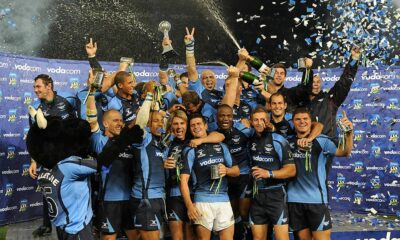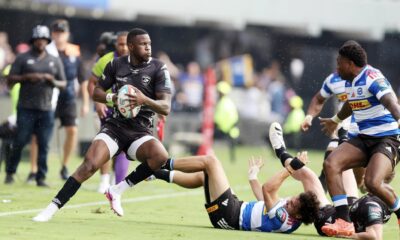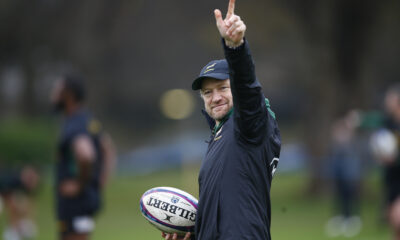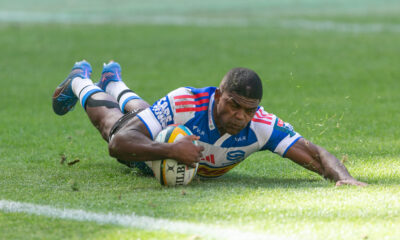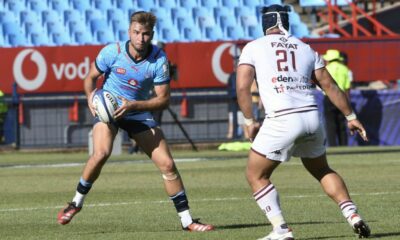International Rugby
Springboks’ best world is combination of two worlds
Everything should be done to ensure the Springboks are at maximum strength for the 2019 Rugby World Cup in Japan.
My Business Day Newspaper column is dedicated to how to make this a reality.
The very best South African players overseas are part of the solution to a healthier 2018 Springboks. The best of the best will also make the Springboks more competitive at the 2019 Rugby World Cup in Japan.
There is no longer a conclusion to the South African domestic season. The Cheetahs and Kings continue to play in the newly expanded Pro 14 in Europe, with the Cheetahs a probable play-off challenger.
Elsewhere it will be everything but an off-season for South African rugby, with more than 300 South African players on duty in Europe, the United Kingdom, Ireland and Japan.
There are many prominent South African superstars among those 300 and there’s also a good portion of players who would never survive as professional players in South Africa.
But there are some very good ones and it would be in South Africa’s best interests if there was mature business-like discussion regarding the merits of these players.
The South African professional landscape domestically is not strong enough for the Springboks to be a top three international team. The Boks, if they continue to invest only in domestic player selections, will be a team whose ambitions will be consistent with the second tier ranking of five, six or seven.
What is primary to any selection? It’s the results of the Springboks.
There should be a revolutionary approach to maximize the best results at the World Cup every four years, and in the interim the best of those in the south and north should make a contribution to the strength of the Springboks.
The conditioning aspect is always the first thing mentioned in opposition to picking overseas-based players. Coaches, like Jake White and Rassie Erasmus, who coached Montpellier and Munster respectively, have told me that the players are not as well conditioned as those in the southern hemisphere. It doesn’t mean they can’t be selected and it doesn’t make them in any way poorer selections to those local based Springboks who have struggled to make an international impression.
Forget player identities for the moment and focus on the principle of selection. Erasmus, as Director of Rugby and charged with the strategy and selections of the Springboks in 2018, can only be in a stronger position if his plans include a few camps up north to assess the conditioning and mindset of players he feels can be an asset at the 2019 World Cup. These camps would follow a similar blueprint to those camps he will no doubt hold with South African players from the Super Rugby and Pro 14 competitions, who are based in South Africa.
I’d envisage the core of the June international squad to play England being from those South African players in South Africa, while the end of year tour in November would have a greater emphasis on those players Erasmus feels could add to the squad depth in Japan in 2019.
It’s about moving beyond the run on XV. The strength of a team is in the match 23 and in having like for like replacements to make up a world-class squad of 30 at the 2019 World Cup.
It certainly is possible. There are also lessons to be learned from the All Blacks’s respective 2011 and 2015 World Cup campaign, when it comes to ensuring veterans aren’t unnecessarily retired but commit to bringing through the next generation within the squad.
I’ve consistently held the view that it should never be an ‘either/or’ situation when it comes to determining who plays for the Springboks. It should be about combining the best of both worlds to get to South Africa’s best rugby world.
Transformation (read quotas) is also too easily bandied about as a reason for the Springboks’s failure. The argument has no merit when 12 of the starting 15 are consistently white players.
There are black players in South Africa every bit as good as their white counterparts. It’s about identification in selection and then playing opportunity.
Similarly, when assessing the merits of those who play up North.
International Rugby
URC: Julius stars but the Lions roar loudest at Ellis Park
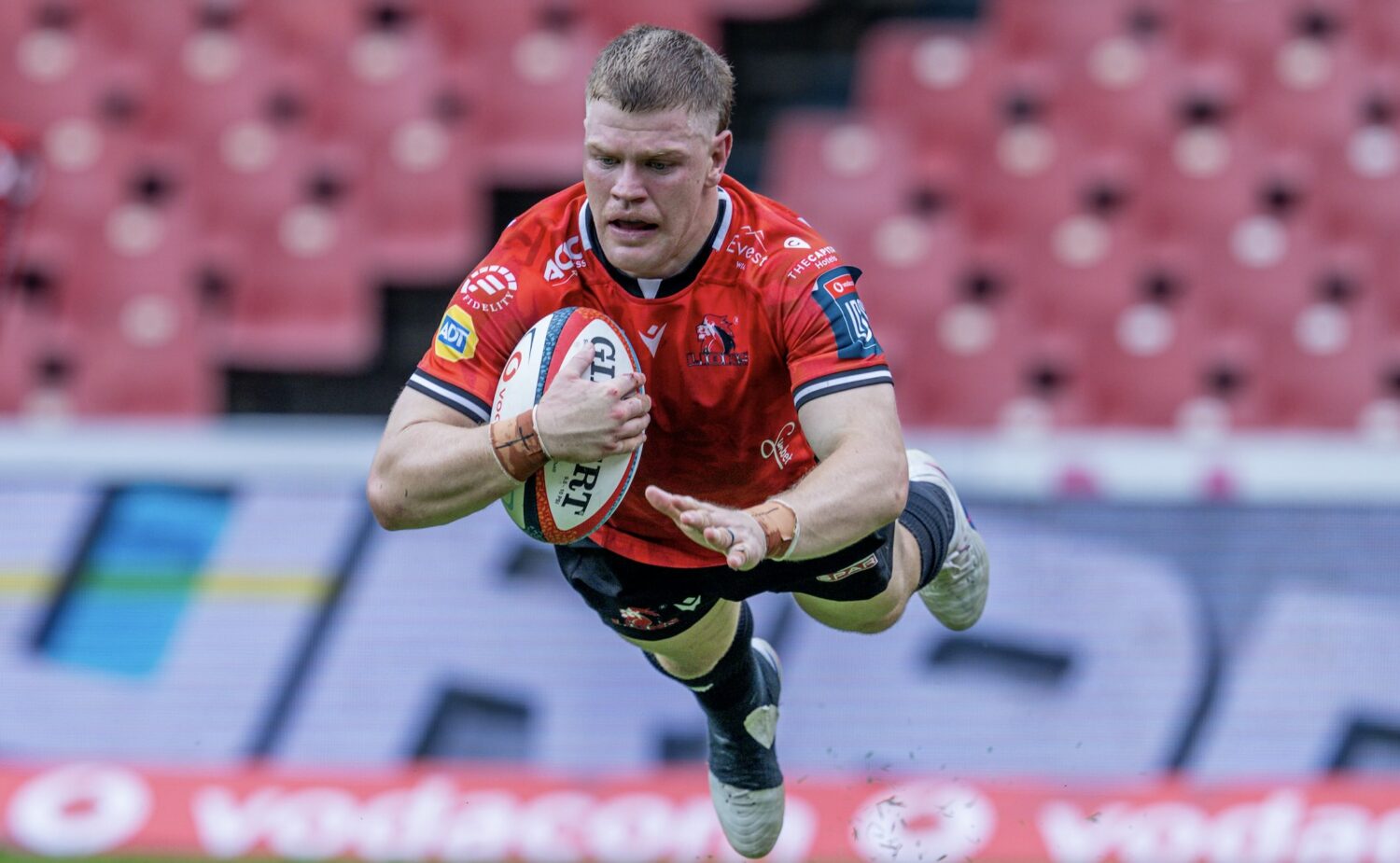
URC: The Lions, with Morne van den Berg massive, roared the loudest at Ellis Park with an emphatic win against the Sharks, for whom Jurenzo Julius was the best player.
Morne van den Berg was the pick of the Lions and the best player on display in the Lions bonus point win. The Springboks scrum half was at the heart of everything good about the Lions performance, in a Round 8 match that was played between Rounds 11 and 12 of the competition.
The win moves the Lions into seventh place in the URC and it also kept alive the SA Shield. Had the Sharks won, they would have claimed the Shield, given they already had three bonus-point wins in four matches against their South African colleagues.
The Sharks have beaten the Bulls and the Stormers twice and lost in the final play against the Lions in Durban a month ago.
But it is the Lions who now can claim the Shield if they beat the Stormers at Ellis Park next Saturday.
The Sharks will play the Bulls at Loftus in Pretoria next week and the Stormers and Bulls will complete the South African derbies within the URC in Pretoria on the 14th March.
The Lions coach Ivan van Rooyen picked his strongest match 23 and they were too powerful and precise for a Sharks match 23 missing seven of their first choice Springboks. Sharks coach JP Pietersen invested in youth and some hardened veterans, but the collective of the Sharks could not match the individual class of 21 year-old centre Jurenzo Julius, who ran with condition and with reward, scored a try, had one disallowed and always made metres in the tackle.
JULIUS IN BOKS MIDFIELD AUDITION
Veteran lock Jason Jenkins battled hard, but that was the lot for the visitors who are ninth in the URC league standings. They have four wins in 11 matches.
Van den Berg was the general at No 9, his halfback partner Chris Smith did not miss a kick at posts and the Lions midfield of Bronson Mills and Henco Van Wyk were convincing as a pairing.
Wingers Angelo Davids and Kelly Mpeku chased everything and turned every kick into an attacking one.
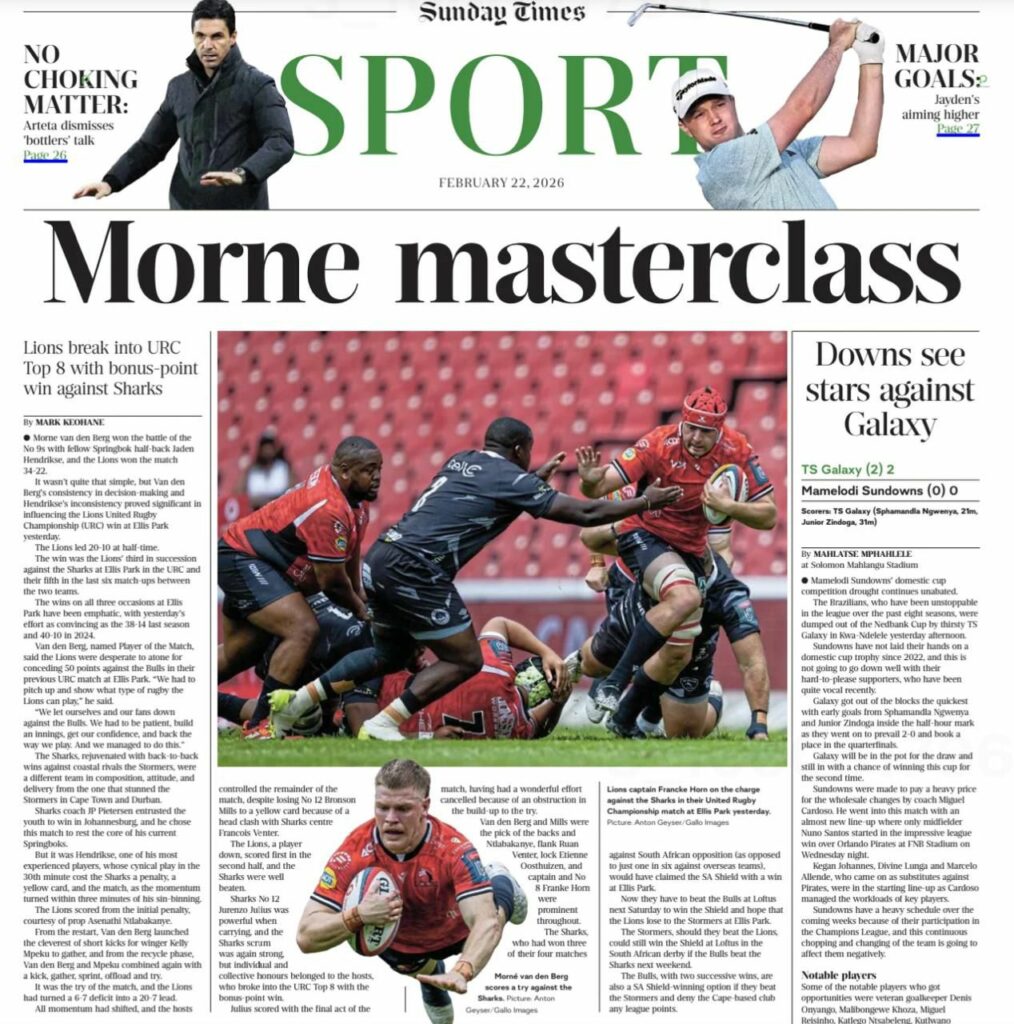
Lions fullback Quan Horn was confident and flanker Ruan Venter, lock Ettienne Oosthuizen were a menace and a presence. My personal favourite Asenathi Ntlabakanye produced trademark tackles, handled the tighthead side of the scrum effectively and was regular in taking the ball to the line.
Van den Berg was very good and the Lions were very good in responding from the 52-17 defeat a fortnight ago against the Bulls at Ellis Park.
The Lions have beaten the Sharks in the last three matches at Ellis Park in the URC, each time comfortably, and have won five of the last six matches against the Sharks.
UNITED RUGBY CHAMPIONSHIP LATEST – WATCH THE LIONS v SHARKS HIGHLIGHTS
International Rugby
Ireland find their identity & Scotland find a way to win away from home
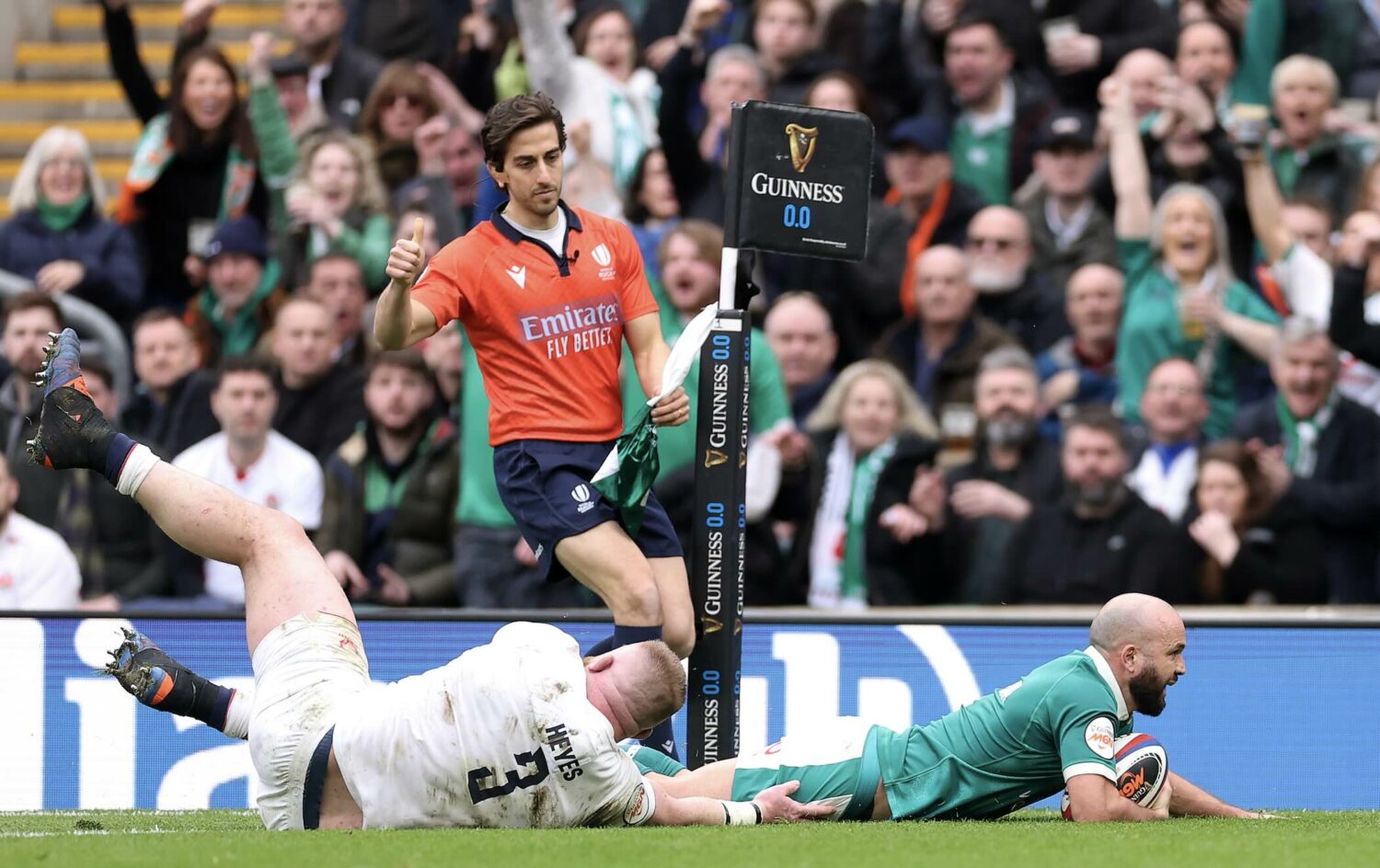
Ireland are celebrated for finding their identity in a record 42-21 win against England at the Allianz Stadium in Twickenham and Scotland are lauded for finding a way to win a Six Nations match away from home. Here’s your media summary.
What the English media led with
-
England’s recurring fast-start problem became the story again – an opening half-hour where Ireland went 22-0 up and effectively ended the contest.
-
The post-match tone is brutal: “humiliation”, “nightmare”, “questions everywhere” around England’s direction, selection calls, and a side that’s messy under pressure (turnovers, set-piece errors, poor exits).
-
Even where England “had entries”, the message is the same: they didn’t convert pressure into points, and Ireland did – clinically.
What the Irish media led with
-
A statement win built on speed, accuracy and edge – Ireland’s first-half blitz, then second-half control (Sheehan’s early score after the break = the hammer).
-
The Irish framing is “old guard / leaders / selection calls justified” – Crowley steering, Gibson-Park snapping, McCloskey giving them gainline ballast.
-
Farrell’s tone in reaction coverage: values + connection + belief (less “tactics board”, more “identity restored”).
Former players / influential voices (social + pundit loop)
-
Dan Sheehan (via ITV quote carried by SA Rugby Mag): framed it as hunger + belief + emotional lift after the France loss – and called it one of their best performances.
-
The wider pundit theme (echoed across liveblogs + post-match reaction): Ireland’s dominance wasn’t fluke finishing – it was system + tempo + accuracy, with England chasing shadows and confidence.
-
“I backed England” regret content is already circulating (ex-player prediction culture) with former England fullback Mike Brown getting stick in UK rugby-content spaces after calling it wrong. He is just one of many. Andy Goode called for a rethink of Steve Borthwick as head coach and challenged Borthwick for a rethink of his selections.
South African view (SA Rugby Mag)
Two clean angles SA Rugby Mag are pushing:
-
Mocke the notion that three weeks ago England were favourites to win the World Cup, according to their media, and now they have been destroyed, away to Scotland and at home to Ireland on successive weekends.
-
Player-reaction line: Sheehan’s “special” framing – Ireland tapped into travelling support and came out of the blocks.
What Six Nations official platform says …
The official match report leans hard into:
-
Frenetic start, Crowley penalty, then Gibson-Park’s quick-tap try as the tone-setter.
-
The decisive rhythm: England scratched (Dingwall / Lawrence / Underhill), but Ireland had answers (Sheehan + Osborne) and controlled the contest after going 22-0 up.
KEO’S VIEW
I had England to win 30-21 based on Ireland’s lack of form in November against the All Blacks and the Springboks, and their defeat against France in Paris, coupled with their escape at home against Italy a week ago. What I overestimated was the quality of the England team to respond to last weekend’s drubbing against Scotland at Murrayfield. I also thought England would lift for captain Maro Itoje’s 100th Test for England. I underestimated that Ireland would find their identity or play in a way that speaks to the identity that made them a top two side and momentarily had them ranked one in the world. The visitors were superb. This is the first time they have beaten England by more than 20 points. I thought they were as inspiring as England were inept.
EVERY PLAYER AND TEAM STAT AFTER ROUND 3 OF THE SIX NATIONS
WALES v SCOTLAND – Wales improved, Scotland escaped
Result: Wales 23 Scotland 26 (Turner try + Russell conversion in the 75th minute).
Scottish media tone (and Scotland lens generally)
-
The Scotland lens is “not pretty, but champion teams steal these” – resilience, finish, Russell influence, and bench impact (Turner delivering the match winner).
-
Scotland’s broader narrative: they’re alive in the championship picture (table pressure) because they can now win away, even when off their game.
Welsh media tone (and Wales lens generally)
-
The Wales lens is heartbreak with a sliver of hope: this was their best showing of the championship so far, but they still found a way to lose it late (errors, discipline, closing moments).
-
The hard number that will sit in every Welsh recap: 14 straight Six Nations losses (and counting).
Former players / influential voices (social + pundit loop)
-
The Guardian’s live coverage explicitly notes former Welsh captain Sam Warburton praising Wales’ belief/performance despite the late gut-punch.
South African view (SA Rugby Mag)
-
Scotland “snatch” it from a “passionate Wales” – which tells you the editorial emphasis is Wales’ emotional performance and Scotland’s late ruthlessness.
What Six Nations official platform says …
The official report makes it very usable for your structure:
-
Wales deserved the first-half lead: Carre + Adams tries, Costelow kicking, and a genuine edge in the arm-wrestle.
-
The swing: Scotland’s second-half surge, and Wales being denied their first win again a “remarkable comeback” headline win for Scotland.
KEO’S VIEW
The question is what hurts most for the hapless Welsh supporters; to concede 50 points each time at home or to be five minutes away from winning and then to lose by a late converted try after leading 20-5 early in the second half? Scotland showed composure in the final 10 minutes and Wales, so desperate and filled with desire, had nothing left in the tank once Scotland took the lead 26-23. For a neutral it was a bloody good Test, filled with every drama.
International Rugby
Round 3 of Six Nations: Everything you need to know
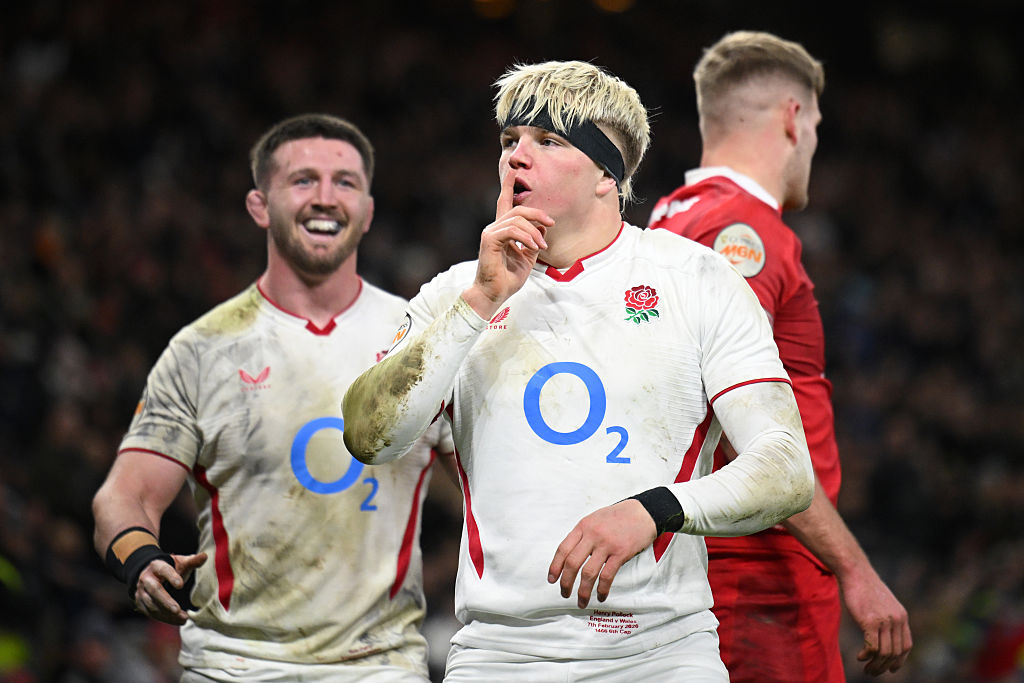
Teams, kick-off times, data, match-ups. Look no further. We have everything you need to know for Round 3 of the Six Nations as France plays Italy, Wales host Scotland and England take on Ireland.
The big talking point this weekend will be the flamboyant England loose-forward Henry Pollock’s first start at No 8.
AFRICA PICKS: WHERE TO MAKE YOUR SIX NATIONS MONEY THIS WEEKEND
WHO’S RUNNING THE HOTTEST IN SIX NATIONS
Six Nations Round 3: Pollock’s Call, Ireland’s Test, Scotland’s Edge, France’s Warning
The headline is at Allianz Stadium. Henry Pollock gets his first start at No 8 for England against Ireland. It is refreshing from England coach Steve Borthwick and it changes the shape of England’s loose trio. Pollock joins Tom Curry and Ben Earl in a back row built for tempo and confrontation.
ENGLAND v IRELAND
Kick-off: 18:00 (UK), Saturday 21 February
Venue: Allianz Stadium
England
Steward; Freeman, Lawrence, Dingwall, Arundell; Ford, Mitchell; Genge, Cowan-Dickie, Heyes, Itoje (capt), Chessum, T Curry, Earl, Pollock.
Replacements: George, Rodd, Davison, Coles, Pepper, Underhill, Van Poortvliet, M Smith.
Ireland
Osborne; Baloucoune, Ringrose, McCloskey, Lowe; Crowley, Gibson-Park; Loughman, Sheehan, Furlong, Ryan, McCarthy, Beirne, Van der Flier, Doris (capt).
Replacements: Kelleher, O’Toole, Bealham, Conan, Timoney, Casey, Frawley, O’Brien.
England’s 12-match winning run ended at Murrayfield, but at home they remain reliable. Their last defeat in London came in November 2024. Since then, nine straight wins. That matters.
Ireland, though, have owned this fixture recently. Five wins from the last six. The only loss in that stretch was a last-minute drop goal in this stadium two years ago.
Andy Farrell reshapes his spine. Jack Crowley starts at fly-half for control. Tadhg Furlong returns to strengthen the scrum. Beirne, Van der Flier and Gibson-Park are back. Ireland are leaning into experience because England at Twickenham demands it.
Recent results:
2025 (Dublin): Ireland 27–22 England
2024 (London): England 23–22 Ireland
2023 (Dublin): Ireland 29–16 England
View this post on Instagram
WALES v SCOTLAND
Kick-off: 16:40 (UK), Saturday 21 February
Venue: Principality Stadium
Wales
Rees-Zammit; Hamer-Webb, James, Hawkins, Adams; Costelow, T Williams; Carre, Lake (capt), Francis, Jenkins, Carter, Plumtree, Mann, Wainwright.
Replacements: Elias, Smith, Griffin, F Thomas, Botham, Hardy, J Evans, Murray.
Scotland
Kinghorn; Steyn, Jones, Tuipulotu (capt), Van der Merwe; Russell, White; McBeth, Cherry, Z Fagerson, Williamson, Cummings, Brown, Darge, M Fagerson.
Replacements: Cherry, Schoeman, Millar-Mills, Williamson, M Fagerson, Horne, Hastings, Graham.
Wales are 0-from-2 and hurting. Scotland arrive confident after reclaiming the Calcutta Cup against England. Momentum says Scotland, recent history in this clash and Wales’s woeful two wins in their last 25 Tests, says it has to be Scotland.
Welsh coach Steve Tandy has made changes. Sam Costelow takes over at 10. Taine Plumtree strengthens the back row and Ben Carter’s form earns him reward. Blair Murray offers bench spark. Scotland have recalled power winger Duhan van der Merwe and Toulouse fullback Blair Kinghorn.
Recent results:
2025 (Edinburgh): Scotland 35–29 Wales
2024 (Cardiff): Wales 26–27 Scotland
2023 (Edinburgh): Scotland 35–7 Wales
View this post on Instagram
FRANCE v ITALY
Kick-off: 15:10 (UK), Sunday 15 February
Venue: Stade Pierre Mauroy
Italy left Dublin believing they are good enough to beat the very best, but still vulnerable in the big clutch plays. They pushed Ireland and were frustrated not to get the job done. The problem now is scale. France have opened this championship with authority and pace.
Last year in Rome, France dismantled Italy, but the more relevant match is the 13-all draw in Lille in 2024. Paolo Garbisi hit the post from a penalty attempt with the last kick of the match. It would have been Italy’s first win against France in France.
Italy’s backline is ambitious and their pack is no longer passive, but France, in the 2025 Six Nations and in the opening fortnight of 2026, have set the standard.
Recent results:
2025 (Rome): Italy 24–73 France
2024 (Marseille): France 13–13 Italy
2023 (Rome): Italy 24–29 France
If you want a snapshot of the weekend’s matches, England have entrusted youth in the name of Pollock, Ireland have opted for experience and the old guard, Wales, well they continue to search for relevance, and Scotland want consistency. Italy have belief but they are up against the best team in the competition who are playing with the authority of a champion.
International Rugby
Who’s running the hottest in the Six Nations
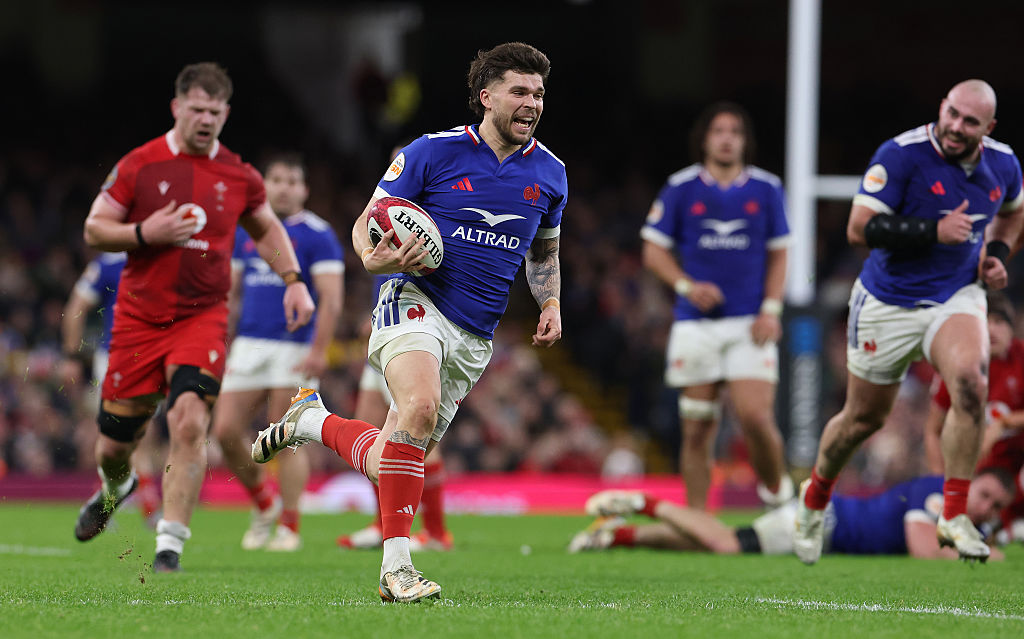
France have dominated the first fortnight of the Six Nations and they will continue the dream start to the 2026 tournament when hosting the improving Italy. Individually, the French players are also making the biggest statistical statements.
The French backs Louis Bielle-Biarrey, Theo Attissogbe and Matthee Jalibert are the most prominent in attack, with the two wingers three tries each second only to England winger Henry Arundell’s four.
No 10 Jalibert has scored two tries and made 32 carries, three more than his halfback partner Antoine Dupont, and four less than fullback Thomas Ramos’s 36. England’s No 8 Ben Earl has made the most carries (41).
Ramos, Bielle-Biarrey, Jalibert and Attissogbe are placed second to fifth in metres made, with Wales’s Louis Rees-Zammit topping the list with 238.
Jalibert, who was sensational for Bordeaux in the Investec Champions Cup Pool rounds, has been as good for France in the Six Nations.
No player has such a presence in so many facets of play.
Jalibert (10), Ramos (8) and Dupont (5) have made the most offloads, and Jalibert’s four try assists is the most.
Jalibert (10), along with Rees-Zammit, England’s Tommy Freeman and Scotland’s South African-born winger Kyle Steyn, has beaten the most defenders.
Jalibert (21) and Dupont (29) have combined for 50 kicks in play. England flyhalf George Ford leads the list with 34. Ford’s kick metres are the most, 1245, while Dupont (third with 827 metres) and Jalibert (sixth with 610 metres) total 1437 metres.
Jalibert (7) and Dupont (6), as a halfback duo, have no equal in the competition, combining for 13 kicks retained. Scotland’s Ben White, individually, is the leader with 10.
Jalibert (13) has bounced the most kicks, with Ford (11) in second place and Dupont third with 10.
Lineout steals have been minimal and Italy’s Manuel Zuliani and Michele Lamaro are the best with two each.
Defensively, Wales’s Aaron Wainwright (9) and Freeman (9) lead the dominant contact, with France’s Charles Ollivon and Earl (7) the next best.
Wainwright, with this dominance in contact, has the most post contact metres (55), followed by Freeman and Earl with 53 each.
The French attack has been on fire but defensively the French have been as good. Lenni Noguchi and Oscar Jegou, along with Italy’s Manuel Zuliani and Lorenzo Cannone and Steyn are grouped at the top with four each in the dominant tackle category.
(Lorenzo) Cannone, with 37, has the most successful tackles. Niccolo Cannone has 35 and Jegou 34.
Scotland’s Rory Darge (6) has won the most turnovers, with Zuliani second (5) and France’s Michael Guillard and Ireland’s Stuart McCloskey on four each. Winger Attissogbe has won three turnovers.
Wingers understandably dominate the attacking catch success with Ireland’s James Lowe, Arundell, Italy’s Louis Lynagh and Bielle-Biarrey all successful with two catches.
Ramos and Ford have scored the most points and they are the two most accurate sharpshooters, with Ramos tops with 85.7 percent and Ford striking at 81.8 percent.
EVERY PLAYER AND TEAM STAT FROM THE 2026 SIX NATIONS
International Rugby
France on fire as rugby’s media react to Six Nations
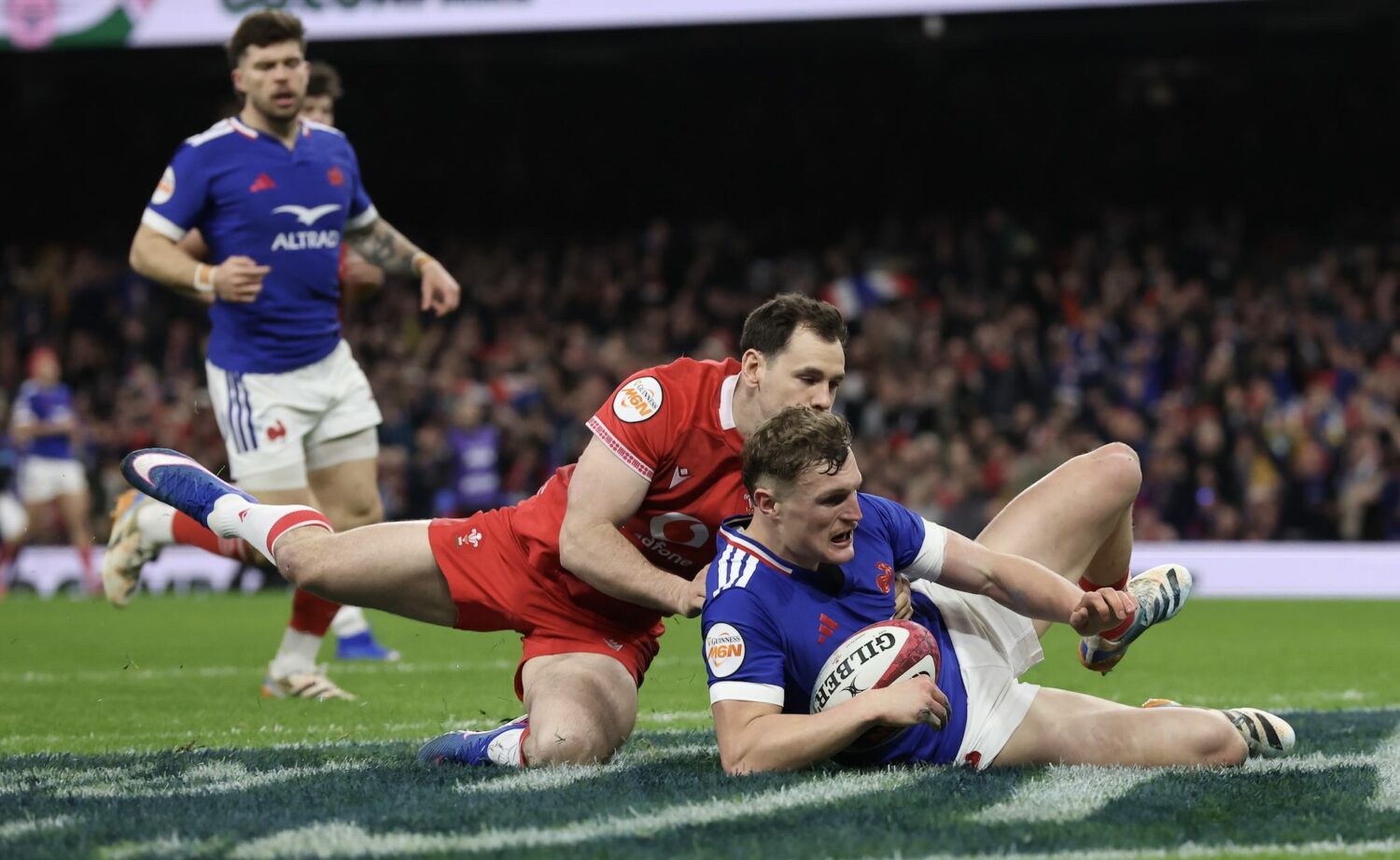
France are on fire, dispatching Wales with ease in Cardiff in Round 2 of the Six Nations. Scotland were the Brave and Ireland were the fortunate in Dublin. But on the evidence of two Rounds the world champions and No 1 ranked Springboks are still some way ahead of the chasing pack, which is more France than anyone else.
For those who don’t have time to scan every rugby site for Six Nations reaction, here is your summary, with the scanning brilliance of Chat and my own wrap and understanding of what unfolded.
AFRICA PICKS: DID YOU CASH IN ON YOUR SIX NATIONS BETS?
WALES v FRANCE (Cardiff) Reaction: “France are ruthless; Wales are broken”
Result context: France ran in 8 tries and hammered Wales 54–12 in Cardiff.
Six Nations official tone: “record-breaking” French performance; clinical, fast, and brutal.
The Northern Hemisphere themes (what the NH media agreed on)
1) France’s attack is now operating at “Grand Slam pace.”
The common thread: France didn’t just win – they stacked pressure, scored early, and never came down. Their execution looked title-ready, not “round-two ready.”
2) Jalibert ran the game; the French back three feasted.
Reuters singled out Matthieu Jalibert as “masterful”, with France’s shape and kicking hurting Wales repeatedly.
The Guardian focus: wings/finishers cashing in, with Théo Attissogbe front-and-centre.
3) Wales’ defensive system was the story and not in a good way.
Wales missed 31 tackles, with a 68% tackle success figure doing the rounds.
It also wasn’t lost on anyone that the crowd mood and attendance reflected a nation’s frustration.
-
Six Nations official: framed France as the tournament’s most clinical force; “run riot / record-breaking” framing.
-
Reuters: Jalibert masterclass; Wales defensive collapse; low attendance noted.
-
The Guardian: Attissogbe-led romp; France’s young backs looked fearless; Wales outclassed.
South African view (SA Rugby Mag / SA angle)
-
SA Rugby Mag (digital): blunt headline energy – “Rampant France rout woeful Wales” and the key SA takeaway: France are the only side still tracking a Grand Slam after two rounds.
-
Times Live: explicitly positioned this French run as a Springbok warning shot, tying it to SA’s own demolition job in Cardiff last November.
SCOTLAND v ENGLAND (Murrayfield) Reaction: “Scotland ambushed them; England had no Plan B”
Result context: Scotland beat England 31–20 and lifted the Calcutta Cup, ending England’s long winning run.
The Northern Hemisphere themes
1) Scotland’s start won it (and England never truly recovered).
Reuters captured it cleanly: Scotland sprinted into an early lead and played with belief; England spent the match chasing field position and control.
2) Finn Russell ran the show.
Across reports: Russell was the conductor control when needed, ambition when it was on.
3) Discipline (and Arundell) became England’s headline.
The red-card narrative dominated English-facing reaction, especially tabloid coverage.
4) “Plan A stalled” became the RugbyPass verdict.
RugbyPass pushed the familiar critique: England look blunt when their first pattern doesn’t land.
-
The Guardian: Scotland “stunned” England; big tries, big moments, and England’s errors/discipline issues.
-
Reuters: Scotland’s recent Calcutta Cup dominance underlined; Russell masterclass; Arundell card pivotal.
-
The Sun: framed it as Arundell “hero-to-zero”, Grand Slam hopes crushed on the Murrayfield hoodoo.
-
Sky Sports: breakdown angle on why England unravelled (discipline, start, game control).
South African view (SA Rugby Mag)
-
SA Rugby Mag: “Storming Scotland end England’s winning run” straightforward: England’s streak snapped; Scotland revived their campaign; Townsend milestone context.
-
SA Rugby Mag follow-up: quotes/angle pieces include Borthwick acknowledging England “gave them too big a start.”
IRELAND v ITALY (Dublin) Reaction: “Italy proved they belong; Ireland survived”
Result context: Ireland won 20–13, but the reaction was far more about Ireland’s wobble and Italy’s growth than Irish dominance.
The Northern Hemisphere themes
1) Ireland were “unconvincing” Italy dragged them into a scrap.
That “Ireland survived” framing is consistent across live reports and match wrap language.
2) Italy’s first-half performance made the story.
Italy led at the break; a maul try and defensive bite put Ireland under heat.
3) The Italian press angle: pride + frustration (and ‘it was there’).
Italian coverage leaned into: “great Italy for a half”, match flipped after the break, and the missed chance to land a historic result.
Outlet-by-outlet snapshot (Ireland + Italy)
-
Irish Times: Italy led 10–5 at half-time; Ireland turned it with second-half tries (Conan/Baloucoune) to regain control.
-
The Independent (UK): headline framing: “Unconvincing Ireland overcome half-time deficit” again, the win without the glow.
-
Gazzetta dello Sport (Italy): strong Italy for a half; Ireland “trembled” but won; the swing came after the break.
-
RAI News (Italy): second half “capsized” what looked like an Italian day; Italy started “azzurro” but Ireland flipped it.
-
Federazione Italiana Rugby (FIR): official Italian union tone: “grandissima Italia” that scared Ireland; positives to take even in defeat.
-
OnRugby (Italy): positioned it as the “almost” moment and a national conversation piece (reaction roundup).
FOR ALL THE LATEST PLAYER AND TEAM STATS FROM ROUND 2 OF THE SIX NATIONS
-
2026 Six Nations fixtures:
https://www.keo.co.za/2026-six-nations-fixtures-confirmed-france-to-open-blockbuster-campaign-on-a-thursday/ -
France v Ireland analysis:
https://www.keo.co.za/how-transformed-france-tortured-inept-ireland-in-paris/ -
Previous British media reaction piece:
https://www.keo.co.za/england-hammer-wales-as-british-media-deliver-brutal-six-nations-verdict/
International Rugby
Super Rugby Pacific: South African rugby is bigger without you
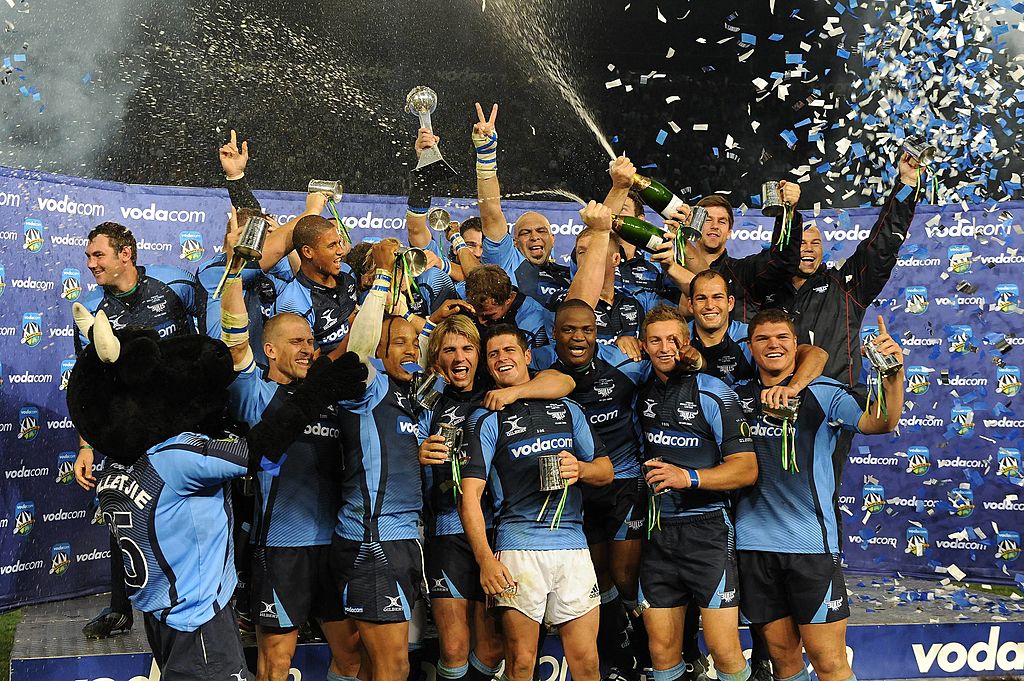
A message to Super Rugby Pacific. South Africa doesn’t want back into your competition. Not now. Not ever.
Super Rugby Pacific CEO Jack Mesley, speaking to Martin Devlin on DSPN, dismissed the idea of South African teams ever returning.
Pressed directly, he said:
“No.”
Asked why he would not welcome South Africa back into the competition, Mesley replied:
“If you go back and look at the data, those games did not rate well. They did not attend well. They did not rate like we’re rating now. They did not attend like we are attending now.”
He added:
“I think there is a romance associated with the South African days.”
Devlin joked:
“It always is about the girlfriend who leaves, mate.”
Mesley laughed and concluded:
“Even a South African one.”
Romance?
Let’s deal in reality.
The Springboks have thrived post Super Rugby’s exit.
Since South Africa shifted north post-Covid and into the United Rugby Championship and Investec Champions Cup, the Springboks have become the dominant force in world rugby.
- Two Rugby World Cups in 2019 and 2023.
- Back-to-back Rugby Championship titles in 2024 and 2025.
- Five wins in their last six Tests against the All Blacks.
- A record 43-10 demolition in Wellington.
- A 35-7 humiliation at Twickenham.
This is more a measurable dominance than it is a sentimental nostalgia.
South African clubs now play in a weekly high-intensity cross-hemisphere competition against Ireland’s provinces, French heavyweights and English power clubs. They play against Welsh, Scottish and Italian teams. The URC and Champions Cup demand travel, adaptability, and confrontation with contrasting styles.
It has hardened South African players tactically and physically.
They are preparing for Test rugby and World Cups. This is not the exhibition of Bledisloe or the basketball of Super Rugby Pacific.
The All Blacks have regressed since South Africa left Super Rugby
New Zealand’s post-Covid Test record tells a different story.
For the first time in the professional era, the All Blacks have looked physically vulnerable. They have been bullied at the collision and they have lost multiple home Tests. They have been beaten consistently by the Springboks.
The annual three-week Super Rugby tours to South Africa once conditioned New Zealand franchises for brutality. Playing the Bulls at Loftus, the Stormers in Cape Town, the Sharks in Durban, and making trips to Bloemfontein and Ellis Park were a weekend physical audit.
That audit no longer exists.
Super Rugby Pacific is now largely an internal New Zealand competition with Australian and Pacific participation. The physical edge that South African teams brought has disappeared.
Eddie Jones, speaking to Devlin, bluntly addressed the decline.
“That’s the other thing that’s changed for New Zealand Rugby; Super Rugby was the greatest influence on world rugby for a long period of time. Whatever happened in Super Rugby basically set the trend for the game.”
He continued:
“Unfortunately, Super Rugby has dropped in terms of status. We all know South Africa has left, and now it’s a competition that doesn’t have as much influence around the world.”
What Jones is articulating is the structural erosion of the competition. Super Rugby, in its original Super 12 guise, had no equal in world rugby’s club environment. Super Rugby Pacific is now an afterthought to competitions like the Investec Champions Cup, the URC, the English Prem and France’s Top 14.
Super Rugby Pacific produces strong local derbies and healthy domestic numbers, but globally, its relevance has shrunk.
The winner is almost invariably a New Zealand side, the style is about attack and little regard for the nuances of Test rugby, especially World Cup rugby, and the buzz word is entertainment, ball in play and no respect for the pressure moments that define World Cup titles.
Test rugby is not exhibition rugby.
When confronted by the Springboks’ power game or France and England’s pack-driven precision, the All Blacks have looked less conditioned for the grind.
South Africa, meanwhile, are conditioned weekly in Europe and then sharpened further in the Rugby Championship.
The Arrogance
New Zealand Rugby previously dismissed South Africa’s contribution to Super Rugby. The outgoing CEO Mark Robinson made clear that the competition would move on without South Africa before even formally informing SA Rugby leadership.
Robinson, an average All Black, has been even more mediocre as NZ Rugby CEO. His reward for cocking it up was to get a job from his Aussie mate (World Rugby Chair) and namesake Brett Robinson, as the Chief of Rugby.
Chief of Rugby? What the Chair means is a portfolio created before appointing Robinson as the CEO of World Rugby.
It is messy, but not as messy as the illusion that Super Rugby Pacific has a global appeal.
SUPER RUGBY PACIFIC CEO MESLEY MOCKS SA RUGBY
Mesley speaks of romance and laughs at the idea of a South African return. Look, he is an Aussie, so that explains a few things.
But to believe he knows rugby is a stretch, despite the purple prose on his appointment.
Super Rugby Pacific Chair Kevin Malloy said Mesley’s strong marketing background and practical skillset made him ideally suited to the Super Rugby Pacific CEO role.
“What set Jack apart from a strong pool of candidates following a thorough search was his passion for rugby, his enthusiasm and a breadth of experience in both marketing and sports,” Malloy said.
OK, if you want to believe that Kev!
These are strange times in New Zealand rugby.
An ex-All Black in Robinson rejuvenated the Springboks in kicking South Africa out of Super Rugby and an Aussie marketer has added to New Zealand’s misery with his promotion of an insular Pacific competition.
The irony in the Republic is that South Africa still respects New Zealand. It is the Test South Africans always want to experience.
The Greatest Rivalry Tour later this year is sold out, within hours of tickets going on sale.
The All Blacks remain rugby’s most recognisable brand in South Africa, and there is no smugness in the Republic when South African rugby people speak of NZ Rugby or the All Blacks. There is only respect and a varying degree of adulation.
Mesley speaks with a smirk about South African romance in Super Rugby, but the South African game has grown stronger on every front since moving north and New Zealand rugby has grown smaller without South Africa.
There is a word in South Africa for dismissive arrogance dressed up as data. There is a word for Mesley.
It starts with a P … and it isn’t Pacific.
International Rugby
England hammer Wales as British media deliver brutal Six Nations verdict
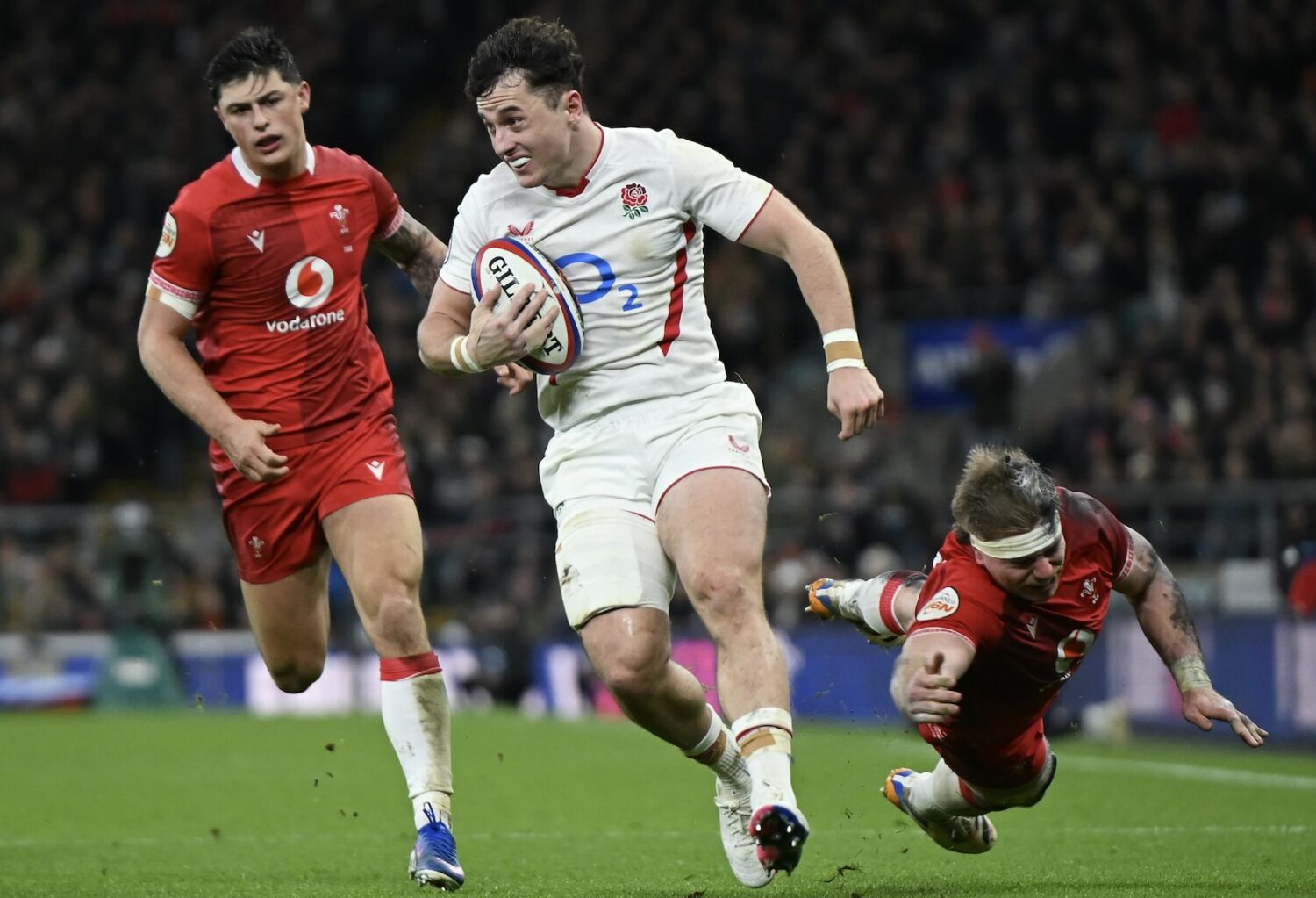
England didn’t just hammer Wales 48-7 at the Allianz Stadium in Twickenham; they reminded the visitors that they will only be good for the wooden spoon in the 2026 Six Nations.
The contest was over before kick-off but confirmed as officially over before the 20th minute when Wales trailed 10-0 and were reduced to 13 players. That score doubled to 22-0 before the 30th minute and it could have been even more damning but for England’s inaccuracy and many poor decisions when playing 15 versus 13.
The British media were ruthless in their assessment of England’s demolition of the Welsh, with the flameless Dragons offering no resistance. Their discipline collapsed, belief vanished, and England didn’t need to be spectacular to be savage.
Henry Arundell scored a hat-trick and No 10 George Ford was voted Player of the Match. Wales’ catastrophic discipline, turned a historic rivalry into a one-sided examination.
Across the UK press, the only argument was about how deep Wales’ problems run.
Planet Rugby
Planet Rugby framed the match as an England statement, focusing on clarity of attack and ruthless punishment of Welsh indiscipline. Their assessment was that England didn’t chase miracles – they simply played what was in front of them and dismantled a side repeatedly reduced by yellow cards.
🔗 https://www.planetrugby.com
RugbyPass
RugbyPass led with England “running riot”, highlighting Arundell’s finishing and Ford’s authority at No 10. The tone was decisive: Wales lost control early and never recovered, leaving England to dictate tempo, territory and scoreboard.
🔗 https://www.rugbypass.com/news/england-stars-run-riot-as-wales-dismantled-in-six-nations-opener/
BBC Sport
BBC Sport focused on England’s composure, stressing how quickly the contest slipped away once Wales started collecting yellow cards. England were praised for discipline and patience – doing nothing spectacular, but everything right.
🔗 https://www.bbc.com/sport/rugby-union
The Guardian
The Guardian called it a resounding win, pointing out England left points on the field while Wales self-destructed. Their report linked the performance to wider Welsh instability, suggesting the problems extend well beyond 80 minutes.
🔗 https://www.theguardian.com/sport/2026/feb/07/england-wales-six-nations-match-report
Rugby365
Rugby365’s reaction was blunt and familiar: ill-discipline killed Wales, England simply obliged. The outcome was decided early, repeated penalties and cards ensuring no route back.
🔗 https://rugby365.com
SA Rugby Magazine
SA Rugby Mag viewed the result through a global lens – England rising, Wales regressing. Less about the score, more about trajectory, with England building momentum in winning for a 12th successive match, and Wales stuck in survival mode.
🔗 https://www.sarugbymag.co.za
Welsh response
Welsh media reaction were more sombre than angry. Discipline, fragility and a lack of physical authority were recurring themes. The concern is no longer about losing to England; it’s about how easily Wales are folding under pressure.
*Italy beat Scotland 18-15 in Saturday’s early game.
HOW THE MEDIA RATED FRANCE BEATING IRELAND 36-14
ALL THE PLAYER AND TEAM STATS FROM ROUND 1 MATCH CENTRE OF THE 2026 SIX NATIONS
International Rugby
How transformed France tortured inept Ireland in Paris
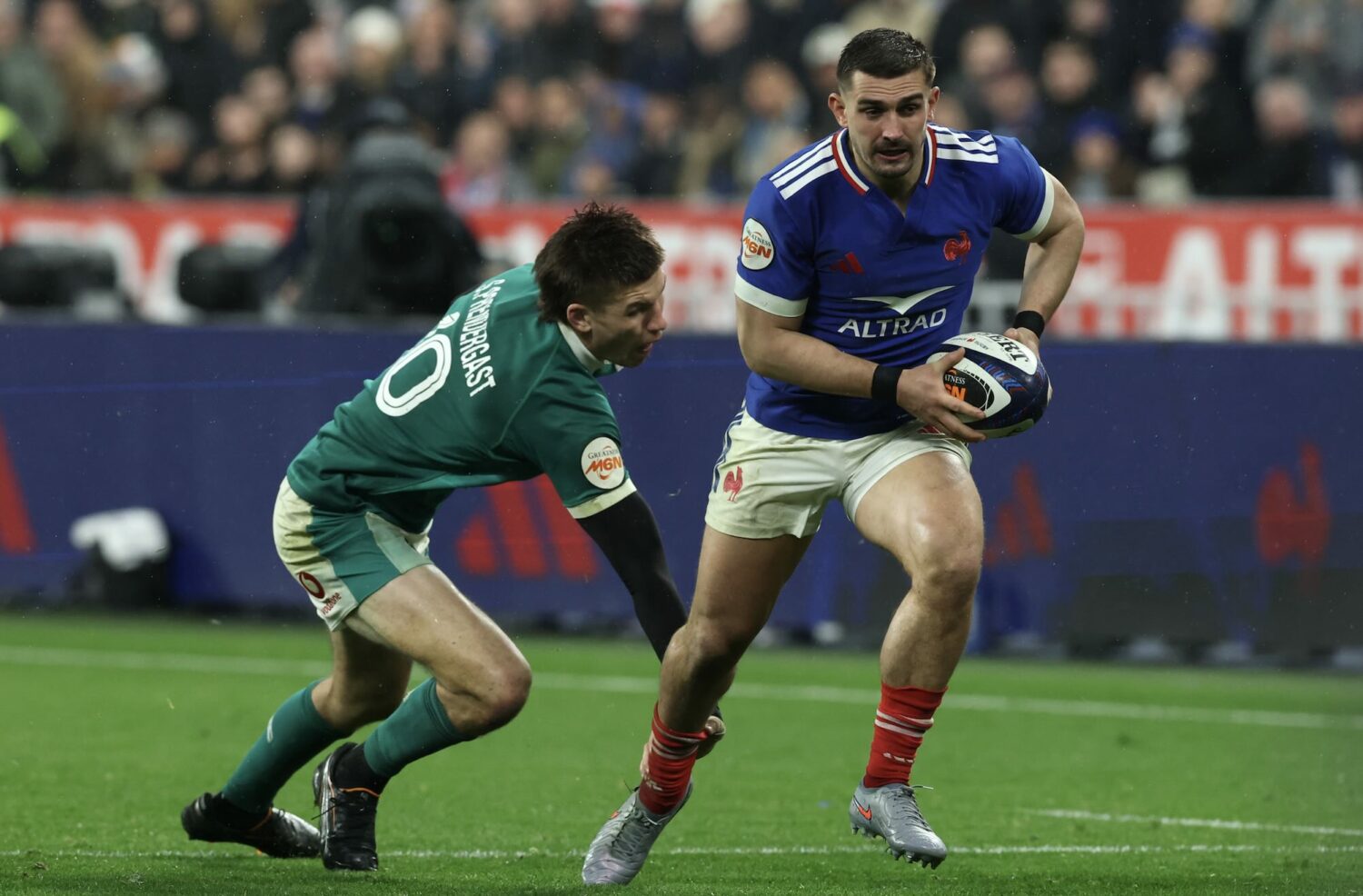
France changed players, approach and tactics to torture Ireland 36-14 in Paris in the Six Nations. We look at the difference between 2026 win and the 2025 win by France against Ireland in Dublin.
Ireland 27 France 42
Six Nations 2026 – Paris
France 36 Ireland 14
Here’s what France did differently.
1) 2026: France dominated the match. 2025: France stole it with efficiency.
Dublin 2025: Ireland had 58% possession and 53% territory, and France still won by 15. France were happy to defend for long stretches (they made 187 tackles) and then punish Ireland when the game fractured.
Paris 2026: France flipped that script. They had 55% possession and 59% territory and played the game mostly in Ireland’s half. That’s not “clinical counterpunching”. That’s control.
The tell: France ran for 588 metres in 2026 vs Ireland’s 385. In 2025 it was basically even (474 vs 477). France went from “equal metres, better strike-rate” to “more ball, more territory, more metres, more everything.”
2) 2026: France carved Ireland open. 2025: France finished better than Ireland.
Clean breaks
-
2025: France 7 clean breaks, Ireland 5 (tight margin).
-
2026: France 19 clean breaks, Ireland 5 (a gulf).
That’s the difference between a game you win and a team you hurt.
3) 2026: France’s pressure forced Irish errors at scale.
Ireland’s “handling under heat” fell apart in Paris:
-
2026 turnover knock-ons: Ireland 11, France 6
-
2025 turnover knock-ons: Ireland 7, France 3
France didn’t just wait for mistakes in 2026. They manufactured them with territory, line-speed, and contestable moments.
4) 2026: Ireland couldn’t tackle France. In 2025 they couldn’t stop France finishing.
-
2025 missed tackles: Ireland 23 (France 16)
-
2026 missed tackles: Ireland 42 (France 21)
That’s not “a few soft shoulders”. That’s structural stress: repeated breaks, repeated reloads, repeated one-on-ones lost.
5) 2026: France won the first hour. 2025: France won the key moments (and the second-half surge).
In Paris, Ireland were 29–0 down before they got going. France had already cashed the bonus point and then eased.
In Dublin, France’s big statement was the second-half blitz, after losing Antoine Dupont early (he went off around the half-hour and later it was confirmed as a cruciate injury).
So:
-
2025: a win built on resilience + clinical finishing after disruption.
-
2026: a win built on front-foot brutality + sustained dominance.
6) The halfback axis changed – and so did the type of threat.
In 2026, with Ntamack out, Jalibert started and had a direct hand in multiple tries, while Dupont called their connection “very positive.”
That matters tactically: Jalibert tends to play flatter and more visibly, and France’s attack in 2026 looked like a team choosing to rip you open in-phase, not just punish you when you overplay.
The simplest summary
Dublin 2025: France were ruthless in chaos – even while defending for long spells.
Paris 2026: France were ruthless in control – more territory, more breaks, more metres, and Ireland cracked.
This is where the regression is most obvious – and most damaging.
1) Physical dominance at the contact point
Ireland’s biggest slide is brutally simple: they are no longer winning collisions consistently.
Against France in Paris, Ireland were regularly knocked backwards in contact, which killed their ability to play fast, accurate phase rugby. Once that happens, everything else collapses – tempo, shape, decision-making.
A season earlier in Dublin, Ireland could still absorb France’s power and recycle quickly. In 2026, France dictated the gainline on both sides of the ball and Ireland were playing from behind bodies instead of on top of them.
This is the clearest regression because Ireland’s entire system is built on fast ruck ball. Take that away and the system has no oxygen.
2) Defensive resilience under sustained pressure
Ireland used to bend without breaking. They now bend, fracture, and then leak tries.
The missed-tackle spike in Paris wasn’t about effort – it was about:
-
repeated reloads
-
fatigued edge defenders
-
centres and back-three players making late, reactive reads
In Dublin 2025, Ireland could survive France’s big moments and reset. In Paris 2026, once France scored early, Ireland never regained defensive authority. The scoreline at halftime wasn’t a fluke it was the logical outcome of structural stress.
3) Attacking clarity without Johnny Sexton
This is not about nostalgia – it’s about control.
Ireland have regressed in:
-
in-game management
-
territory selection
-
when to slow down a match
In Paris, Ireland chased the game far too early, forcing passes under pressure instead of building pressure. Sexton’s absence isn’t about individual brilliance – it’s about knowing when not to play.
Ireland still have quality decision-makers, but they don’t yet have a single, dominant conductor who can steady the ship when momentum is gone.
4) Backline punch against elite defences
Ireland’s backs no longer frighten top-tier defences the way they did in 2022–2024.
Against France:
-
line breaks were rare
-
defenders were not fixed
-
edge space was never clean
France could defend honestly and aggressively, without having to overfold or gamble. That is a massive red flag.
A year ago, Ireland could create indecision. In Paris, France defended with certainty.
5) Psychological authority
This is subtle – but it matters.
Ireland used to walk onto the field believing they could impose themselves on anyone. In Paris, once France landed early blows, Ireland looked like a team hoping the storm would pass rather than one capable of changing the weather.
The best Ireland sides of recent years could absorb momentum swings and reassert control. This version struggled to do either.
The uncomfortable truth
Ireland haven’t fallen off a cliff – but they have slipped off a plateau.
They are no longer physically dominant, tactically inevitable, or psychologically imposing against the very best.
FRANCE 36 IRELAND 14: EVERY PLAYER AND TEAM STAT
AFRICA PICKS: YOUR BEST MONEY-MAKING SIX NATIONS BETS
*CHAT supported
International Rugby
Fiery French applauded as alarm bells ring for Ireland
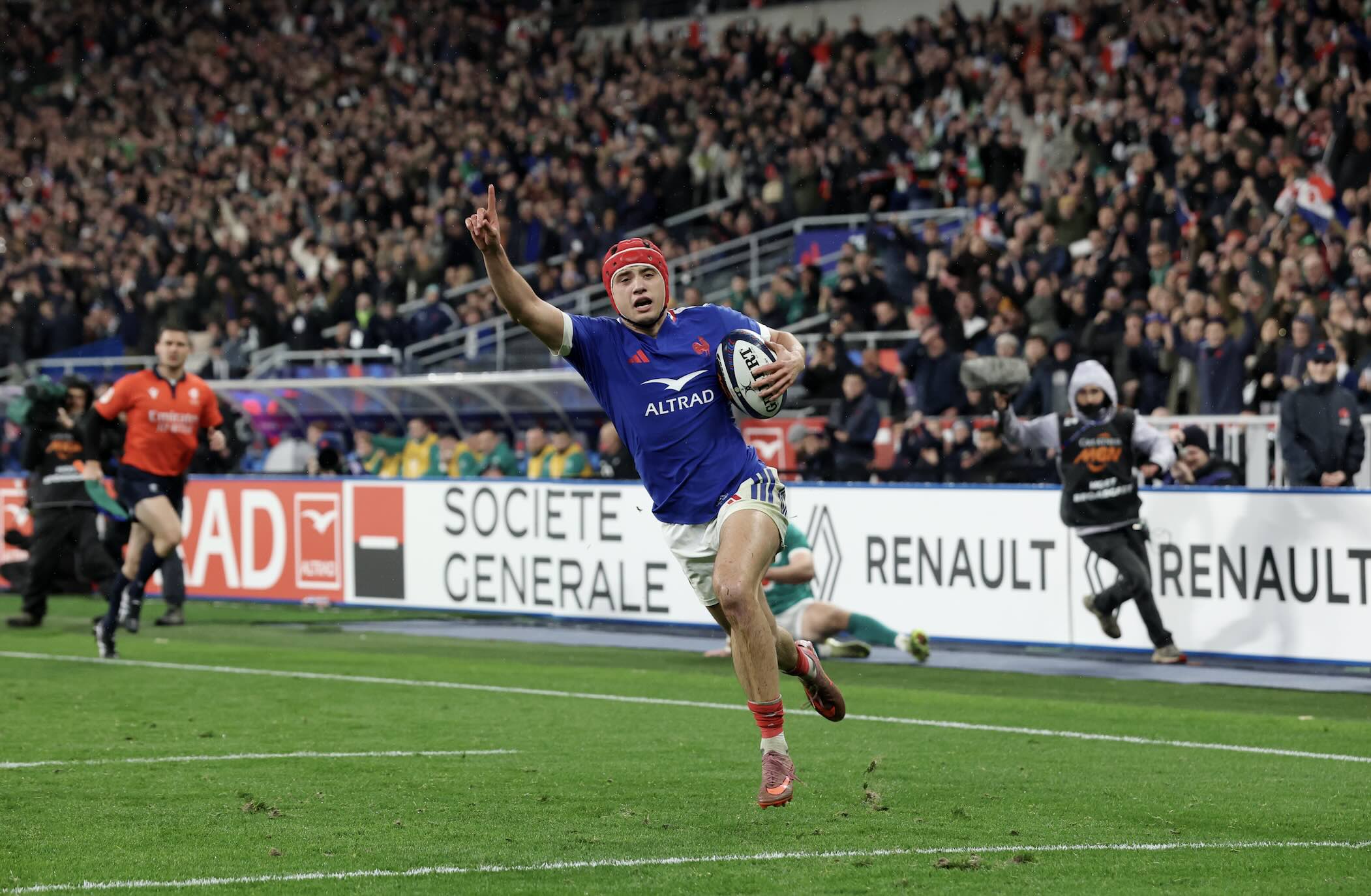
Conviction in the performance, but caution in the storytelling summarised the French media reaction to their brutal 36-14 Six Nations win against Ireland Paris. For the Irish, it was a case of alarm bells ringing.
France had destroyed the Irish in Dublin 42-27 a season ago having led 42-15 with 10 minutes to play. Two late tries added some comfort for Irish supporters. Then came the defeat to the All Blacks in Chicago and the humiliation against the Springboks in Dublin.
Paris was equally damning for Ireland as they were steamrolled.
France led 22 nil at half time and 29 nil after 57 minutes.
Two Irish tries between the 60th and 65th minutes offered more caution to France than hope to Ireland and the hosts finished the final five minutes attacking the Irish try line before crossing for their fifth try.
France are the bookies’ favourites to defend the Six Nations title won last season.
I asked my mate at ChatGPT to do a round up of how the Irish and French Rugby Media reacted to the match.
The Irish Times
Tone: bruised realism.
Summary: framed it as a throwback “Parisian beating” and a reminder of “bad old days” patterns, with Ireland blown away early and left trying to salvage dignity late.
Irish Independent
Tone: alarm bells, big-picture worry.
Summary: leaned into “new reality” language: Ireland didn’t lose a classic, they lost a mismatch, and the margin could have been uglier without the late rally.
Irish Examiner
Tone: sharp critique of Ireland, plus the French pace-setter angle.
Summary: sold it as France starting and finishing with a flourish while Ireland were “abject” for too long; a fast French start “filleted” Ireland before the game ever became a contest.
The Times
Tone: statement win, title warning shot.
Summary: framed it as France sending a message to the championship, with the emphasis on the bonus-point dominance, the early avalanche to 29–0, and Ireland being outmuscled and out-thought until the contest was gone.
L’Équipe (“Le Quippe”)
Tone: controlled praise with a small caution.
Summary: credited a brilliant, accurate French first-half and “seductive” spell, then noted France were less sovereign after the break when they conceded two tries that slightly stained the overall polish.
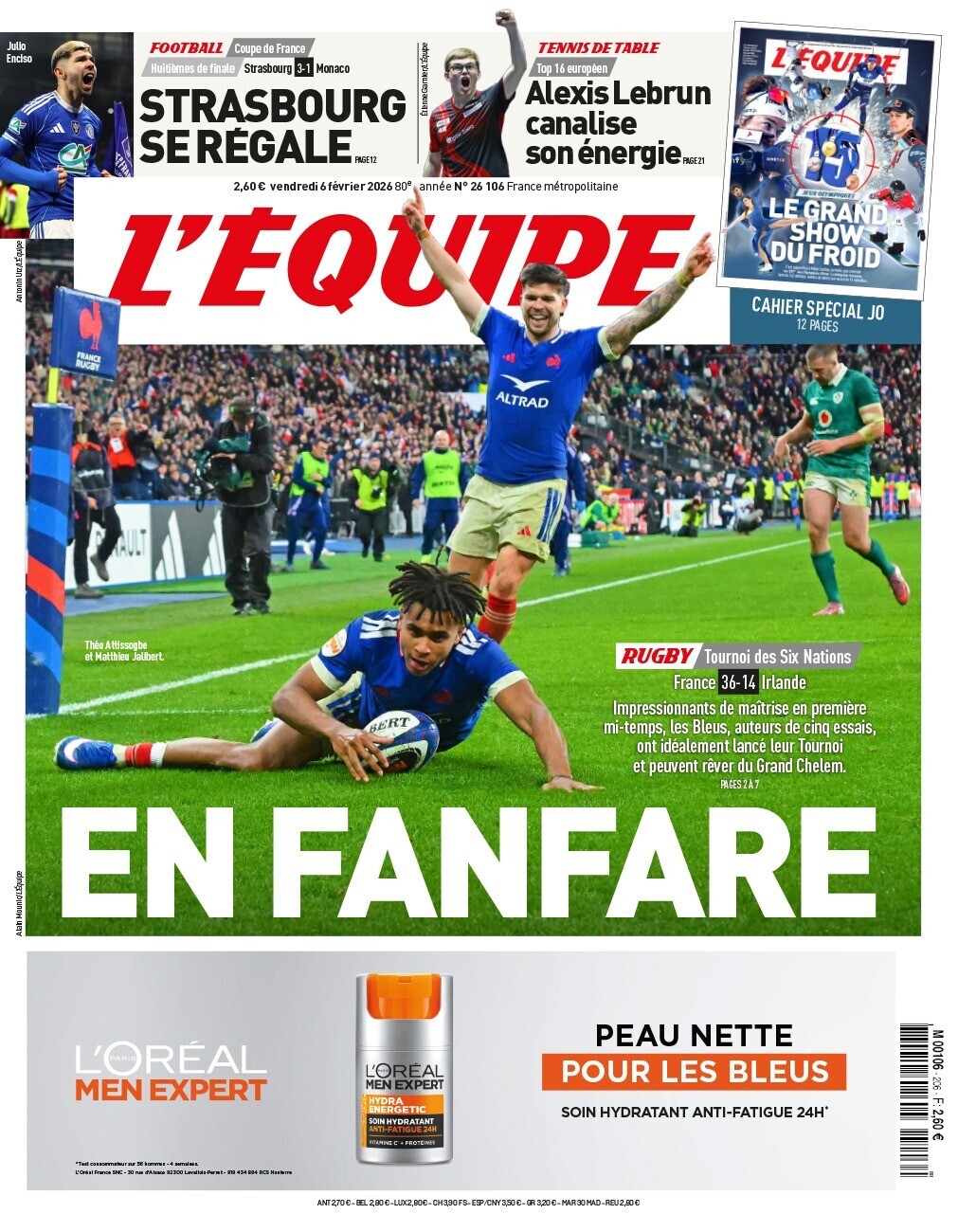
Rugbyrama
Tone: France’s tempo and discipline as the headline.
Summary: stressed how France’s pace exhausted Ireland, how clean the first-half was (discipline/accuracy), then pointed out Ireland only found daylight when France dropped intensity after building the lead.
SA Rugby Magazine
Tone: acknowledgement of quality and statement intent.
SA RugbyMag’s headlines framed the result as France making a statement in their Six Nations title defence, highlighting coach Fabien Galthié’s praise of France’s attacking display in Paris. The emphasis was on the dominance and intent shown by the defending champions rather than harsh analysis of Ireland’s shortcomings.
Rugby365
Tone: bold and definitive.
Rugby365 was unequivocal: France “made a statement” in this opener, labelling the performance a demolition job on one of the Six Nations’ traditional heavyweights. Their report leaned into the idea that France weren’t just winning they were announcing their intentions for the tournament from the first whistle.
Planet Rugby (South African audience perspective)
Tone: tactical and analytical.
Planet Rugby’s reaction, widely read by South African fans, focused on key takeaways from the match: France’s first-half masterclass, sharp player ratings (with Sam Prendergast singled out as struggling for Ireland), and how the French backs and playmakers ran the Irish defence ragged. They combined phrase-by-phrase insights with ratings and analytic angles rather than pure storytelling.
Overall SA reaction themes
South African rugby media weren’t interested in gentle language and they saw France’s dominance as clear and meaningful:
-
Statement performance: France announcing themselves as early title favourites.
-
Clinical attacking rugby: emphasis on the French backs and strategic intensity that pushed Ireland on the back foot.
-
Confirmation of expectations: the result was consistent with pre-match previews and broader Six Nations narratives.
International Rugby
Dupont gives France flex as Ireland face Paris power test
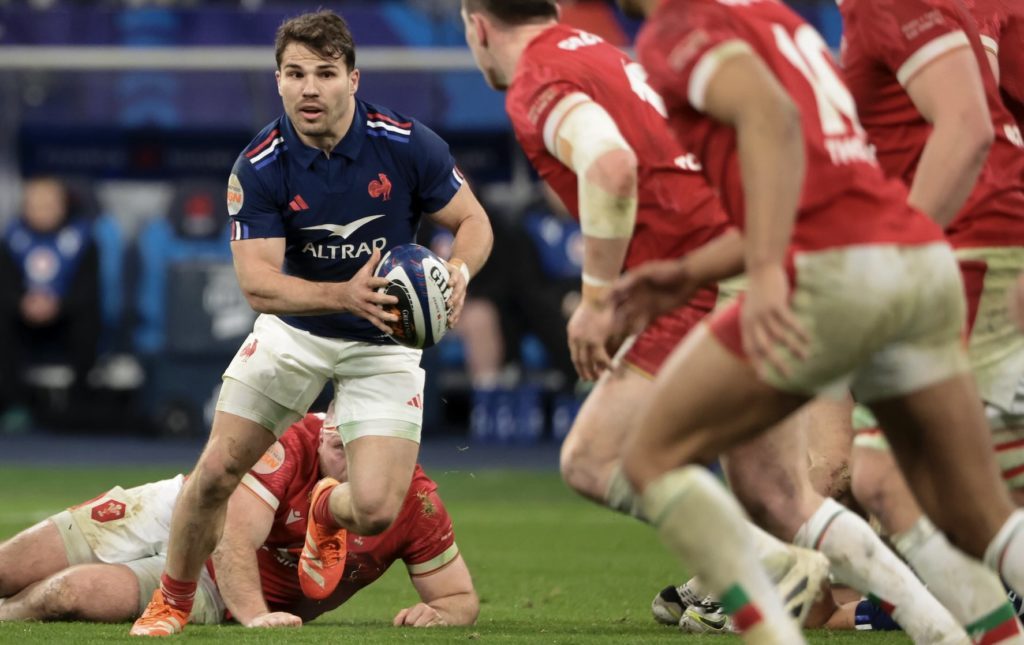
Antoine Dupont is the flex in a fantastic French match 23 that will be too powerful for Ireland in Paris in the Six Nations season opener.
Dupont alters the physics of the contest, and he adds an extra layer of muscle, authority and inevitability to a side already designed to win Test matches through force. His long injury absence is irrelevant now. What matters is what he brings back with him, and that is control, collision dominance and an edge.
Dupont is the best scrumhalf in the world and he he is the national team’s talisman.
But it is up front where all the work will be done for Dupont to play conductor. France’s selection confirm intent and physicality. It is a pack chosen for confrontation.
Jean-Baptiste Gros, Julien Marchand and Dorian Aldegheri are a front row built to scrum, carry and squeeze the life out of opponents, while locks Charles Ollivon and Mickaël Guillard bring physical presence, aerial dominance and edge in the tight exchanges. The back row of François Cros, Oscar Jegou and Anthony Jelonch are physically relentless and they feed off collisions.
This is a French pack that creates the tempo and then Dupont determines the range of this tempo.
Ireland’s pack has peaked and France coach Fabian Galthie would have studied their capitulation to world champions South Africa in Dublin last November. The Boks destroyed Ireland in the scrums and the collisions.
Props Thomas Clarkson and Jeremy Loughman face an enormous examination against Gros and Aldegheri, and if Ireland concede scrum dominance, their entire game model collapses because it is built on control, rhythm and precision rather than chaos.
The French halfback pairing only amplifies that threat. Matthieu Jalibert plays flatter and faster than the Ireland flyhalves of recent seasons, and Dupont’s presence ensures defenders are constantly torn between folding around the ruck or drifting early, a dilemma that France exploit ruthlessly.
Ireland’s continued struggle to replace the authority and game management of Johnny Sexton remains an issue. Sam Prendergast is a talent, but opening a Six Nations campaign in Paris against this French pack is a brutal assignment, and he will be targeted physically and mentally.
ALL THE 2026 SIX NATIONS FIXTURES
The Irish backline, stripped of key personnel, looks noticeably less imposing as a unit. Without Hugo Keenan at fullback, without the aerial pressure and edge of Mack Hansen and James Lowe on the wings, and without the direct power of Bundee Aki at inside centre, Ireland lack the punch that previously allowed them to play beyond the gain line.
France, by contrast, look balanced and settled, with Thomas Ramos offering control and goal-kicking, Louis Bielle-Biarrey providing genuine pace, and Jalibert bringing attacking ambition, supported by centres and wings comfortable in a collision-heavy Test.
Add the significance of the Stade de France on opening night, where French energy multiplies and visiting teams feel pressure accumulate with every lost carry and every retreating scrum, and the advantage tilts decisively towards the hosts. When France dominate the gain line and Dupont starts probing around fatigued forwards, Ireland will be forced to chase a game they are no longer structurally equipped to chase.
This is not about flair or reputation, it is about force, physical authority and control, and France hold the upper hand in the pack, at scrumhalf, off the bench and in the stands.
Just as they did in last season’s match-up in Dublin, which they won comfortably 42-27, having led 42-15 with five minutes to play.
AFRICA PICKS: ALL YOU NEED TO KNOW FOR YOUR FRANCE V IRELAND BETTING
My call: France 33 Ireland 22.
International Rugby
URC ROUND 11 – ALL YOU NEED TO KNOW
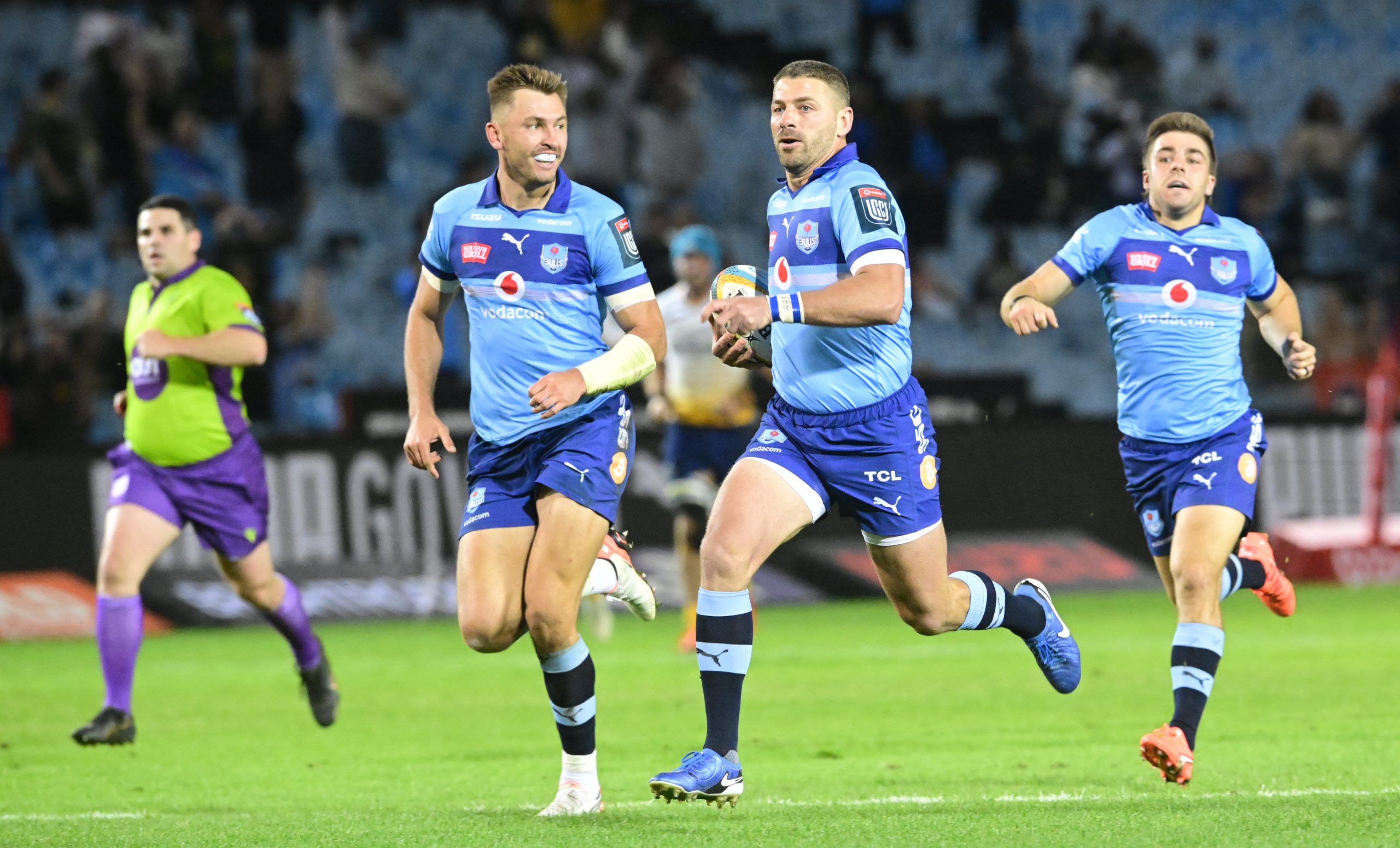
The Sharks host the Stormers in one of two South African URC derbies to end the first half of the league season. The Lions are at home to the Bulls in the northern derby. Here’s everything you need to know for the weekend’s Round 11 showdowns.
The South African teams have all chosen the best available squads in the last Saturday of the month and the last Saturday of URC action until the league resumes in the last weekend of February.
The Six Nations takes priority in February, with the first three rounds played before the URC starts up again for the last eight league matches and the play-offs.
The Stormers, beaten for the first time in the league last Saturday, get the chance of redemption in Durban. It was the Sharks who beat them in Cape Town. The same is true of the Lions and Bulls derby. The Lions earlier in the league, won at Loftus Versfeld in Pretoria.
Several of the Northern Hemisphere clubs are severely understrength for Round 11, as the leading current internationals have been in camp with their respective national teams preparing for next weekend’s Six Nations opening round.
It makes for a punter’s nightmare in these matches because the form guide is not a measurement with so many frontline players missing.
WATCH: KEO & ZELS ON SHARKS, STORMERS, LIONS & BULLS
AFRICA PICKS RUGBY: Keo calls the South African derbies
|
#BENvSCA
#GLAvMUN
#LIOvBUL
#SHAvSTO
#ZEBvCON
#LEIvEDI
#OSPvDRA
#ULSvCAR
|
|
FRIDAY, JANUARY 30 Benetton v Scarlets Stadio Monigo, Treviso – KO 19.45 IRE & UK / 20.45 ITA / 21.45 SA Referee: Andrew Brace (IRFU, 113th league game) AR 1: Clara Munarini (FIR) AR 2: Bisetto Luca (FIR) TMO: Olly Hodges (IRFU) Live on: Sky Italia, S4C, Premier Sports, SuperSport, Flo Rugby & URC.tv Benetton: Rhyno Smith, Ignacio Mendy, Paolo Odogwu, Malakai Fekitoa, Onisi Ratave, Nicolas Roger Farias, Andy Uren (CAPT), Thomas Gallo, Siua Maile, Marcos Gallorini, Giulio Marini, Eli Snyman, Alessandro Izekor, Jadin Kingi, So’otala Fa’aso’o Replacements: Bautista Bernasconi, Destiny Aminu, Tiziano Pasquali, Scott Scrafton, Nelson Casartelli, Alessandro Garbisi, Matt Gallagher, Filippo Drago
Scarlets: Jac Davies, Macs Page, Joe Roberts, Johnny Williams (CAPT), Tomi Lewis; Carwyn Leggatt-Jones, Gareth Davies, Alec Hepburn, Marnus van der Merwe, Archer Holz, Jac Price, Sam Lousi, Max Douglas, Jarrod Taylor, Fletcher Anderson Replacements: Harry Thomas, Josh Morse, Henry Thomas, Jake Ball, Dan Davis, Dane Blacker, Billy McBryde, Iori Badham Benetton Head Coach Calum MacRae said: “Scarlets are one of the Vodacom URC teams that uses the kicking game the most and builds their opportunities through territorial control. The aerial game is an area we definitely need to improve”
Scarlets Interim Director of Rugby Nigel Davies said: “We have looked at these Vodacom URC games, Ulster and Benetton, as a two-game series and it’s important we back up last weekend’s win – we’ve done the first bit, now our focus is on another massive game. “Benetton have recruited well, are coached well and play a good brand of rugby. Like us, they have players missing but will still be very strong. We have selected a side with a lot of talented young players who I am excited to see step up to the challenge on Friday night.” Glasgow Warriors v Munster Rugby Scotstoun Stadium, Glasgow – KO 19.45 IRE & UK / 20.45 ITA / 21.45 SA Referee: Craig Evans (WRU, 72nd league game) AR 1: Ian Kenny (SRU) AR 2: David Sutherland (SRU) TMO: Adam Jones (WRU) Live on: Premier Sports, TG4, SuperSport, Flo Rugby & URC.tv Glasgow Warriors: Josh McKay, Kyle Rowe, Stafford McDowall (CAPT), Kerr Yule, Ollie Smith, Dan Lancaster, Ben Afshar, Jamie Bhatti, Seb Stephen, Murphy Walker, Alex Craig, Jare Oguntibeju, Euan Ferrie, Angus Fraser, Ally Miller Replacements: Grant Stewart, Nathan McBeth, Sam Talakai, Dylan Cockburn, Sione Vailanu, Macenzzie Duncan, Jack Oliver, Matthew Urwin
Munster Rugby: Mike Haley, Thaakir Abrahams, Shane Daly, Dan Kelly, Diarmuid Kilgallen, Tony Butler, Ethan Coughlan, Josh Wycherley, Diarmuid Barron (CAPT), Oli Jager, Evan O’Connell, Fineen Wycherley, Seán Edogbo, Ruadhán Quinn, Brian Gleeson Replacements: Lee Barron, Mark Donnelly, John Ryan, Gavin Coombes, Jack O’Donoghue, Paddy Patterson, Tom Wood, Seán O’Brien Glasgow Warriors Head Coach Franco Smith said: “We are looking forward to seeing our full squad involved this weekend, with everyone eager to finish this block in the right manner.”
“Munster are a proud club with a strong heritage of challenging across all competitions – they will be pushing for the top four once again this season and will bring a strong, physical challenge tomorrow night. “Everyone is looking forward to the test that lies ahead, and running out in front of what’s set to be another sold out Scotstoun.”
|
| SATURDAY, JANUARY 31
Lions v Vodacom Bulls Ellis Park, Johannesburg – KO 12.30 IRE & UK / 13.30 ITA / 14.30 SA Referee: Morne Ferreira (SARU, 20th league game) AR 1: Hanru van Rooyen (SARU) AR 2: Sean Muller (SARU) TMO: Egon Seconds (SARU) Live on: SuperSport, Premier Sports, Flo Rugby & URC.tv Lions: Quan Horn, Angelo Davids, Henco van Wyk, Bronson Mills, Richard Kriel, Chris Smith, Morne van den Berg, SJ Kotze, PJ Botha, Asenathi Ntlabakanye, Ruben Schoeman, Reinhard Nothnagel, Jarod Cairns, Batho Hlekani, Francke Horn (CAPT) Replacements: Morne Brandon, RF Schoeman, Conraad van Vuuren, Etienne Oosthuizen, Darrien Landsberg, Renzo du Plessis, Haashim Pead, Erich Cronje Vodacom Bulls: Devon Williams, Stravino Jacobs, Stedman Gans, Harold Vorster, Kurt-Lee Arendse, Handre Pollard, Embrose Papier, Jan-Hendrik Wessels, Johan Grobbelaar, Wilco Louw, Ruan Vermaak, Reinhardt Ludwig, Marcell Coetzee (CAPT), Elrich Louw, Jeandre Rudolph Replacements: Marco van Staden, Alu Tshakweni, Mornay Smith, Cobus Wiese, Mpilo Gumede, Nizaam Carr, Keagan Johannes, David Kriel Vodacom Bulls Head Coach Johan Ackermann said: “The DNA of the Lions of being a running team is still there, so I expect them to play a fast game at Ellis Park because it was always one of our go-to strategies when I coached there. I think it will be an entertaining game.” ANDRE THE GIANT SLAUGHTERS STORMERS IN CAPE TOWN Hollywoodbets Sharks v DHL Stormers Hollywoodbets Kings Park, Durban – KO 15.00 IRE & UK / 16.00 ITA / 17.00 SA Referee: Christopher Allison (SARU, 7th league game) AR 1: Griffin Colby (SARU) AR 2: Jonathan Lottering (SARU) TMO: Quinton Immelman (SARU) Live on: SuperSport, Premier Sports, Flo Rugby & URC.tv Hollywoodbets Sharks: Aphelele Fassi, Edwill van der Merwe, Ethan Hooker, Andre Esterhuizen (CAPT), Jaco Williams, Jordan Hendrikse, Grant Williams, Ox Nche, Fez Mbatha, Hanro Jacobs, Corne Rahl, Emile van Heerden, Siya Kolisi, Vincent Tshituka, Phepsi Buthelezi Replacements: Eduan Swart, Phatu Ganyane, Vincent Koch, Jason Jenkins, Nick Hatton, Jaden Hendrikse, Siya Masuku, Jurenzo Julius DHL Stormers: Damian Willemse, Dylan Maart, Wandisile Simelane, Jonathan Roche, Leolin Zas, Sacha Feinberg-Mngomezulu (CAPT), Cobus Reinach, Oli Kebble, André-Hugo Venter, Neethling Fouché, Adré Smith, Ruben van Heerden, Paul de Villiers, Ben-Jason Dixon, Evan Roos Replacements: JJ Kotzé, Ntuthuko Mchunu, Zachary Porthen, JD Schickerling, Marcel Theunissen, Stefan Ungerer, Jurie Matthee, Warrick Gelant Zebre Parma v Connacht Rugby Stadio Lanfranchi, Parma – KO 15.00 IRE & UK / 16.00 ITA / 17.00 SA Referee: Ben Whitehouse (WRU, 113th league game) AR 1: Fillipo Russo (FIR) AR 2: Lorenzo Pedezzi (FIR) TMO: Keith David (WRU) Live on: Sky Italia, TG4, Premier Sports, SuperSport, Flo Rugby & URC.tv Zebre Parma: Giovanni Montemauri, Mirko Belloni, Giulio Bertaccini, Marco Zanon, Simone Gesi, Martin Roger Farias, Gonzalo Garcia, Paolo Buonfiglio, Giampietro Ribaldi, Enrique Pieretto, Matteo Canali, Leonard Krumov (CAPT), Giacomo Ferrari, Iacopo Bianchi, Davide Ruggeri Replacements: Shilo Klein, Luca Franceschetto, Juan Pitinari, Franco Carrera, Alessandro Ortombina, Thomas Dominguez, Enrico Lucchin, Bautista Stavile Connacht Rugby: Sam Gilbert, Shane Jennings, Harry West, Cathal Forde, Chay Mullins, Josh Ioane, Caolin Blade, Jordan Duggan, Dylan Tierney-Martin, Jack Aungier, Josh Murphy, Joe Joyce, Paul Boyle (CAPT), Sean O’Brien, Sean Jansen Replacements: Matthew Victory, Peter Dooley, Fiachna Barrett, David O’Connor, Niall Murray, Ben Murphy, Sean Naughton, Oisín McCormack Connacht Rugby Head Coach Stuart Lancaster said: “We were all gutted not to win last week on such a special night for the club, but we’ve had to quickly move on. The same amount of points are on offer this weekend and we know a win will keep us in the hunt for a playoff spot. We’re obviously missing the lads away on Ireland duty but overall, we’ve been able to keep selection relatively consistent these last few weeks, particularly in the backs. It’s been a long stretch of games, but we’ll do everything we can to finish it on a high and hopefully head into the next block of games with a spring in our step.”
Leinster Rugby v Edinburgh Rugby Aviva Stadium, Dublin – KO 17.30 IRE & UK / 18.30 ITA / 19.30 SA Referee: Andrea Piardi (FIR, 59th league game) AR 1: Eoghan Cross (IRFU) AR 2: Shane Gaughan (IRFU) TMO: Matteo Liperini (FIR) Live on: Premier Sports, SuperSport, Flo Rugby & URC.tv Leinster Rugby: Andrew Osborne, Joshua Kenny, Rieko Ioane, Ciarán Mangan, Ruben Moloney, Charlie Tector, Luke McGrath (CAPT), Jerry Cahir, John Mckee, Andrew Sparrow, RG Snyman, Brian Deeny, Max Deegan, Scott Penny, Diarmuid Mangan Replacements: Gus McCarthy, Alex Usanov, Niall Smyth, Conor O’Tighearnaigh, Josh Ericson, Will Connors, Fintan Gunne, Hugo McLaughlin
Edinburgh Rugby: Harry Paterson, Malelili Satala, Wes Goosen, James Lang, Duhan van der Merwe, Ross Thompson, Ben Vellacott; Boan Venter, Jerry Blyth-Lafferty, Paul Hill, Callum Hunter-Hill, Glen Young, Ben Muncaster, Freddy Douglas, Magnus Bradbury (CAPT) Replacements: Harri Morris, Mikey Jones, Ollie Blyth-Lafferty, Tom Dodd, Connor Boyle, Charlie Shiel, Cammy Scott, Piers O’Conor Leinster Rugby Assistant Coach Robin McBryde said: “Edinburgh are a pretty cohesive bunch. I think they’ll be hurting after their result last weekend. They’ll be keen to finish this block on a high as well. It’s always good to finish on a victory before any sort of break because the result sits with you. So it’ll be tough enough. We’ve just got to improve on certain aspects of the game from last Saturday and really knuckle down.” Edinburgh Rugby Head Coach Sean Everitt said: “Going away to Leinster is one of the toughest tests in the Vodacom URC, but it’s a challenge we’re ready to embrace – we’re going over there to have a real crack at it. “Magnus [Bradbury] resumes the captaincy and his experience in these big away fixtures is invaluable for the group. “We know exactly what we are capable of when we put it all together. The key for us this week is a complete 80-minute performance to get the result we want.” Ospreys v Dragons RFC Electric Brewery Field, Bridgend – KO 19.45 IRE & UK / 20.45 ITA / 21.45 SA Referee: Ben Connor (WRU, 7th league game) AR 1: Ben Breakspear (WRU) AR 2: Carwyn Sion (WRU) TMO: Jenny Davies (WRU) Live on: S4C, Premier Sports, SuperSport, Flo Rugby & URC.tv Ospreys: Iestyn Hopkins, Dan Kasende, Phil Cokanasiga, Keiran Williams, Keelan Giles, Jack Walsh (C.CAPT), Reuben Morgan-Williams, Gareth Thomas, Sam Parry (C.CAPT), Tom Botha, James Fender, Ryan Smith, James Ratti, Ross Moriarty, Morgan Morse Replacements: Lewis Lloyd, Steffan Thomas, Rhys Henry, Marco de Witt, Gwilym Evans, Cormac Foley, Max Nagy, Harri Houston Dragons RFC: Angus O’Brien (CAPT), David Richards, Fine Inisi, Aneurin Owen, Rio Dyer, Tinus de Beer, Che Hope, Wyn Jones, Brodie Coghlan, Robert Hunt, Levi Douglas, Seb Davies, Ryan Woodman, Harry Beddall, Harri Keddie Replacements: Oli Burrows, Jordan Morris, Cebo Dlamini, Shane Lewis-Hughes, Evan Minto, Rhodri Williams, Fetuli Paea, Cai Evans Dragons RFC Coach Dale MacLeod said: “Ospreys will be tough. They are a team with a big forward pack, they general start well and are tough to beat at home. “It’s exciting that all four Welsh teams are starting to put some performances together, through all the emotion going on. “They’ll be two good teams playing, I don’t think there will be much in it, and it will be about who holds their head, stays in the game, and owns the little moments. “We’re looking forward to it, they will be too, so it’s going to be a massive challenge.” Ulster Rugby v Cardiff Rugby Affidea Stadium, Belfast – KO 19.45 IRE & UK / 20.45 ITA / 21.45 SA Referee: Hollie Davidson (SRU, 26th league game) AR 1: Robbie Jenkinson (IRFU) AR 2: Sam Holt (IRFU) TMO: Mike Adamson (SRU) Live on: Premier Sports, SuperSport, Flo Rugby & URC.tv Ulster Rugby: Ethan McIlroy, Werner Kok, James Hume, Ben Carson, Zac Ward, Jack Murphy, Conor McKee, Angus Bell, Rob Herring, Scott Wilson, Iain Henderson (CAPT), Charlie Irvine, Matthew Dalton, Marcus Rea, David McCann Replacements: James McCormick, Sam Crean, Bryan O’Connor Harry Sheridan, Lorcan McLoughlin, David Shanahan, Jake Flannery, Ben Moxham Cardiff Rugby: Cam Winnett, Ioan Lloyd, Harri Millard, Steffan Emanuel, Tom Bowen, Callum Sheedy, Johan Mulder, Rhys Barratt, Evan Lloyd, Javan Sebastian, Josh McNally (CAPT), George Nott, Alun Lawrence, Dan Thomas, Taine Basham Replacements: Daf Hughes, Danny Southworth, Joe Cowell, Rory Thornton, Lucas de la Rua, Aled Davies, Elijah Evans, Leigh Halfpenny Cardiff Rugby Coach Corniel van Zyl said: “There’s a real excitement about going up to Belfast and putting in a good performance. That’s been the big aim for the week. “Like every club at this stage of the season, we’re in the same boat. We are missing players to the international game, and it tests our squad. But it is an opportunity and that’s how we’re treating it. “What we’ve seen from Ulster is a team that’s very good at keeping the ball in hand and moving the point of contact. We’ll have to be very good defensively to stay in front of them and keep them out. “They’re very potent in the 22. They’re probably one of the top teams for points scored per entry, so we’ll have to be smart around that.” |
International Rugby
Brilliant Bordeaux bulldoze bewildered Bulls
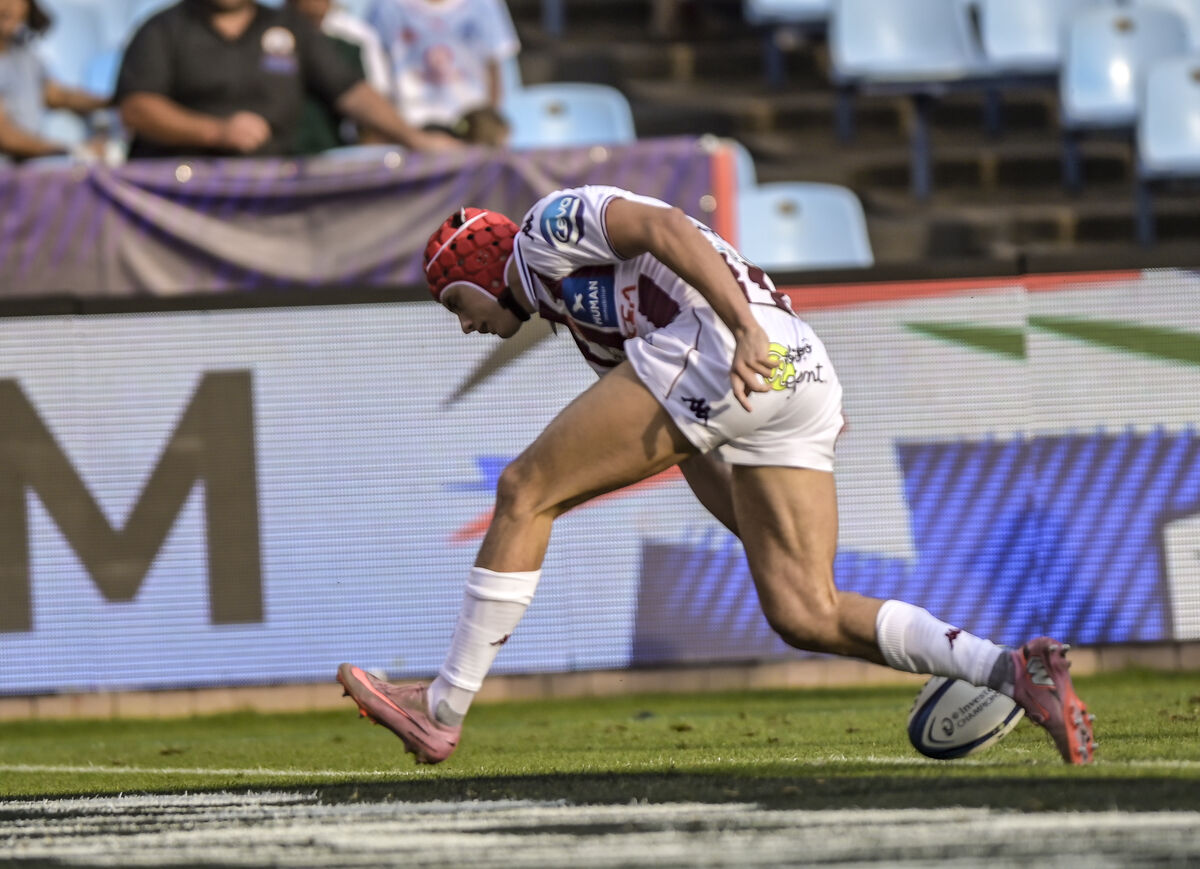
Bordeaux arrived at Loftus as reigning Investec Champions Cup winners and played like a side intent on keeping the crown. The French giants dismantled a disjointed Bulls outfit 46-33, producing a display that was composed, ruthless and dripping with international class, writes Mark Keohane.
And yes – the Bulls somehow led 33-22 at halftime.
The hosts scored five tries in 40 minutes yet never looked in control. The scoreboard offered false comfort and little else.
Bordeaux’s rhythm, tempo and accuracy suggested they were always the side dictating the contest, even when chasing the game.
Bordeaux travelled with 16 internationals in their match-day squad and their stars delivered. With Maxime Lucu and Matthieu Jalibert running the game like seasoned Test generals, and with Damian Penaud and Louis Bielle-Biarrey finishing with the brutality expected of world-class wings, the Pretoria crowd saw the gulf between elite European champions and a South African side still searching for cohesion.
It was breathless early on.
Bordeaux were seven points clear inside three minutes. The Bulls replied, faltered, struck back again, conceded again, and then surged with three late first-half tries. It looked dramatic on paper, but on the field the French were calmer, more accurate and operating with a clarity the Bulls could not match.
Jalibert toyed with the defence, his footwork and timing repeatedly opening space for a slick midfield. Bielle-Biarrey crossed twice, Penaud added to his outrageous tournament tally, and Bordeaux’s pack kept supplying clean, quick ball.
Once the second half kicked off, the Bulls vanished as an attacking threat. The champions tightened their grip, erased the deficit, and moved into a commanding lead with the kind of composure that wins knockout matches.
The Bulls had chances to claw it back to a single-score game, but their basics imploded. A crucial line-out was lost, the scrum wobbled, and the handling in the backline betrayed panic rather than purpose. Bordeaux, on the counter, could easily have added more.
This was a thorough reminder of what a title-winning squad looks like. Seven tries, four conversions and a penalty told the story.
Handré Pollard was solid early, kicked four from five, but a yellow card and two poor decisions shifted momentum the wrong way. De Klerk and Moodie worked tirelessly on the wings, and the loose trio put in the hard metres, but collectively the Bulls were outclassed.
And the biggest red flag: defence.
It hasn’t been good in the URC and it was worse here. Too many missed one-on-one tackles. Too little scramble. Too little structure. Bordeaux didn’t so much pick locks as walk through open doors.
With just 7,300 supporters turning up, the Bulls needed to deliver something worthy of their faithful. Instead, they teased with ten minutes of excellence and followed it with forty minutes of confusion and concession.
Bordeaux left Pretoria looking every bit a team chasing consecutive European titles. The Bulls left with more questions than answers, too few of them comforting.
Scorers
Bulls
Tries: Sebastian de Klerk, Reinhardt Ludwig, Akker van der Merwe, Canan Moodie, Jeandré Rudolph
Conversions: Handré Pollard (4)
Bordeaux
Tries: Damian Penaud, Louis Bielle-Biarrey (2), Maxime Lamothe, Boris Palu, Matthieu Jalibert, Salesi Rayasi
Conversions: Jalibert (3), Maxime Lucu
Penalty: Jalibert
BULLS – 15 Willie le Roux, 14 Canan Moodie, 13 David Kriel, 12 Harold Vorster, 11 Sebastian de Klerk, 10 Handré Pollard, 9 Paul de Wet, 8 Marcell Coetzee (c), 7 Reinhardt Ludwig, 6 Marco van Staden, 5 JF van Heerden, 4 Cobus Wiese, 3 Mornay Smith, 2 Akker van der Merwe, 1 Alulutho Tshakweni.
Bench: 16 Johann Grobbelaar, 17 Gerhard Steenekamp, 18 Wilco Louw, 19 Ruan Nortje, 20 Elrigh Louw, 21 Jeandré Rudolph, 22 Embrose Papier, 23 Stravino Jacobs.
BORDEAUX BÈGLES – 15 Romain Buros, 14 Damian Penaud, 13 Nicolas Depoortere, 12 Yoram Moefana, 11 Louis Bielle-Biarrey, 10 Matthieu Jalibert, 9 Maxime Lucu (c), 8 Temo Matiu, 7 Cameron Woki, 6 Bastien Vergnes-Taillefer, 5 Adam Coleman, 4 Boris Palu, 3 Carlü Sadie, 2 Maxime Lamothe, 1 Jefferson Poirot.
Bench: 16 Gaetan Barlot, 17 Matis Perchaud, 18 Ben Tameifuna, 19 Jonny Gray, 20 Tiaan Jacobs, 21 Arthur Retiere, 22 Rohan Janse van Rensburg, 23 Salesi Rayasi.
International Rugby
Super Stormers dream of Investec Champions Cup glory

John Dobson’s super Stormers are starting to dream of Investec Champions Cup glory after a stunning away win against Bayonne in France in the 2025/26 season’s opening round.
The Stormers won 26-17, despite being a player down for the final half hour.
Dobson was thrilled with the win, coming a week after a history-making first win the URC against Munster in Limerick, Ireland.
The Stormers, who are six from six in the URC, return to South Africa to play another French giant, La Rochelle next weekend. It won’t be in Cape Town as the DHL Stadium is not available and the match will be played at the Nelson Mandela Bay Stadium in Gqeberha.
Dobson mixed and matched for the Bayonne showdown, but pre-match insisted he had picked a match 23 good enough and talented enough to win against Bayonne, who had lost just once at home in the 2024/25 season in all competitions.
Dobson entrusted the talented 21 year-old scrum half Imad Khan to start and the former Bishops pupil and SA Schools star produced a Player of the Match performance. Loose-forward Paul de Villiers, the former SA under 20 captain, was against outstanding, having been the Player of the Match in Limerick a week ago.
WATCH: MATCH HIGHLIGHTS OF THE STORMERS WIN V BAYONNE
Several of the Stormers backs are not regular starting options, which makes the win that much more impressive, but Dobson said it was a credit to the depth within the squad that results like the one in Bayonne are possible without the likes of Springboks Damian Willemse, Sacha Feinberg-Mngomezulu, Cobus Reinach and Warrick Gelant, with the backline quartet not in action in Bayonne.
The Stormers made twelve line breaks to Bayonne’s two, but will lament not being more accurate in their finishing.
SA TEAMS CHASE THEIR FIRST STAR
Loose-forwards De Villiers (14 tackles), BJ Dixon (10) and Ruan Ackermann (7) were strong defensively and lock Connor Evans made 11 tackles. Dixon secured five line out takes, the most for the Stormers, and De Villiers’ all-round contribution was impressive, winning two turnovers, one offload, a line break, nine carries, and 21 metres on attack. He also beat four defenders, as did fullback Simelane.
Dixon (70 minutes), Ackermann (48) and Roos (42), were strong in their carries.
AFRICA PICKS: PICK THE STORMERS TO WIN
Clinton Swart, in his first start at flyhalf kicked two conversions and four penalties for 16 points, while fullback Wandisile Simelane made the most attacking metres (94).
The Stormers line out return was 100 percent.
Bayonne:
Tries: Mori, Erbinartagaray, Paulos
Con: Segonds
DHL Stormers:
Tries: Khan, De Villiers
Cons: Swart 2
Pens: Swart 4
DHL Stormers: 15 Wandisile Simelane, 14 Dylan Maart, 13 Jonathan Roche, 12 Dan du Plessis, 11 Leolin Zas, 10 Clinton Swart, 9 Imad Khan, 8 Ruan Ackermann, 7 Ben-Jason Dixon, 6 Paul de Villiers, 5 Connor Evans, 4 Salmaan Moerat (captain), 3 Neethling Fouché, 2 JJ Kotzé, 1 Ntuthuko Mchunu.
Replacements: 16 Lukhanyo Vokozela, 17 Ali Vermaak, 18 Sazi Sandi, 19 Adré Smith, 20 JD Schickerling, 21 Evan Roos, 22 Dewaldt Duvenage, 23 Ruhan Nel.
BREAKDOWN OF ALL STORMERS AND BAYONNE”S PLAYER AND TEAM STATISTICS
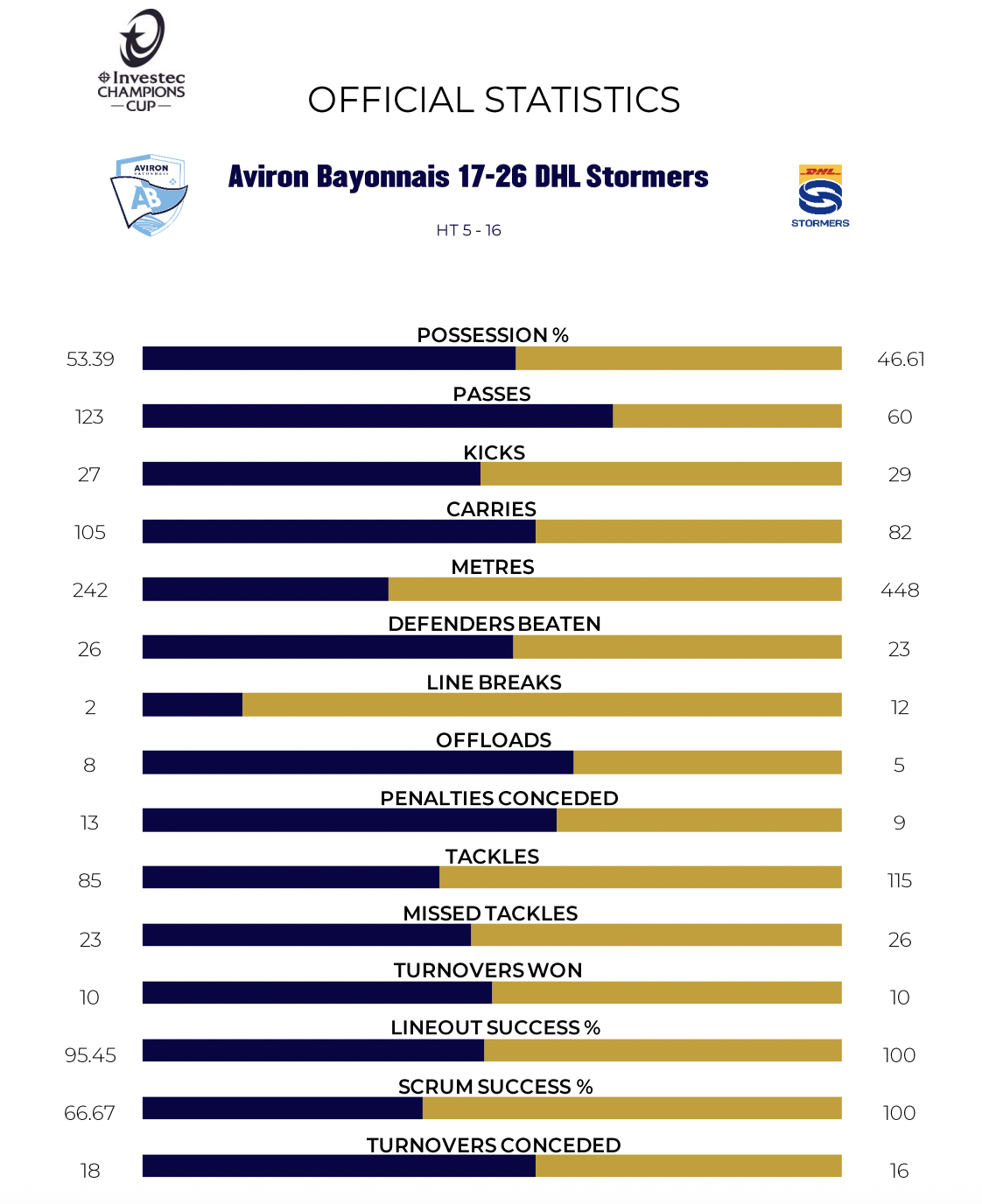
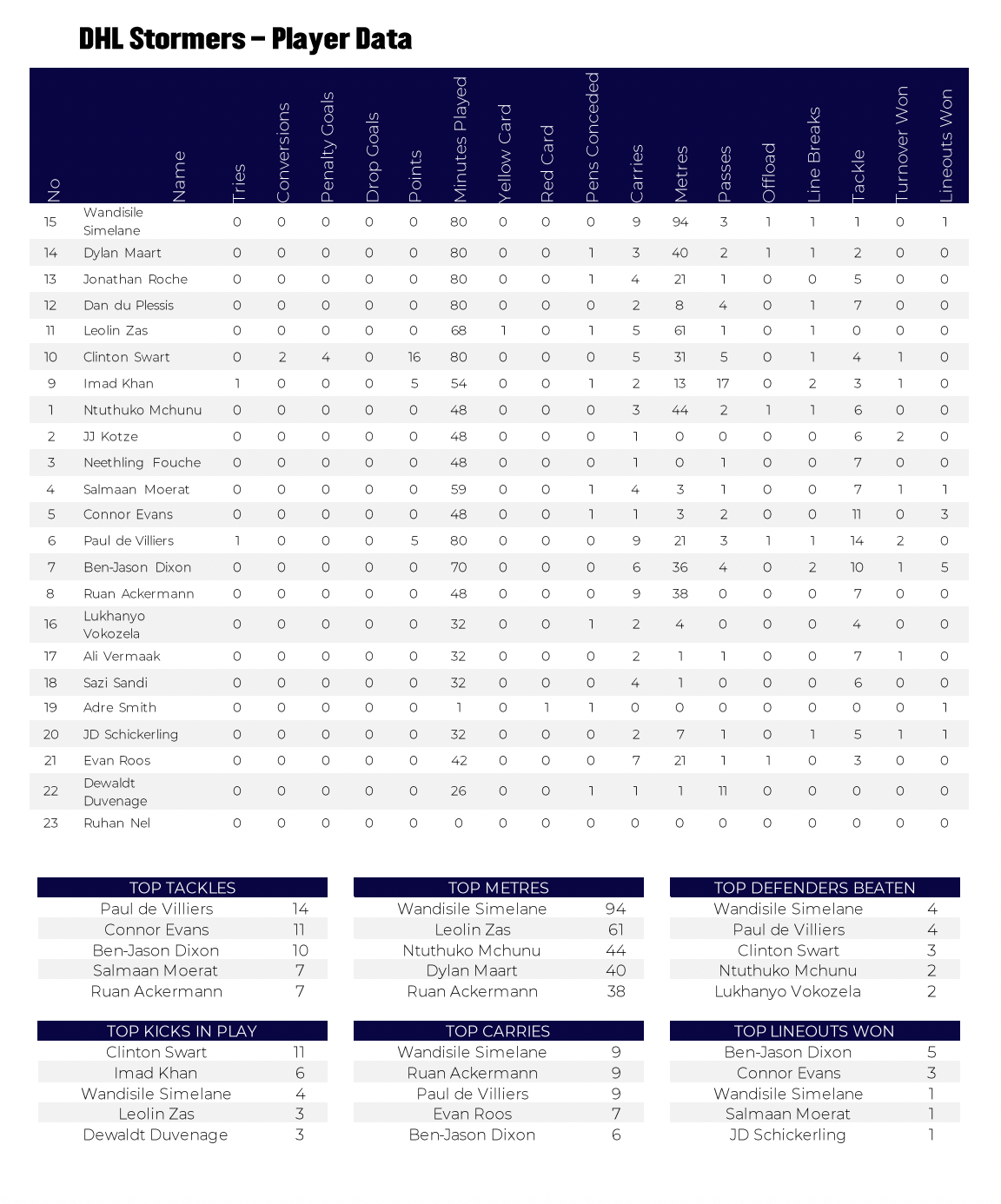
International Rugby
Investec Champions Cup: Bulls back their Boks to bully Bordeaux
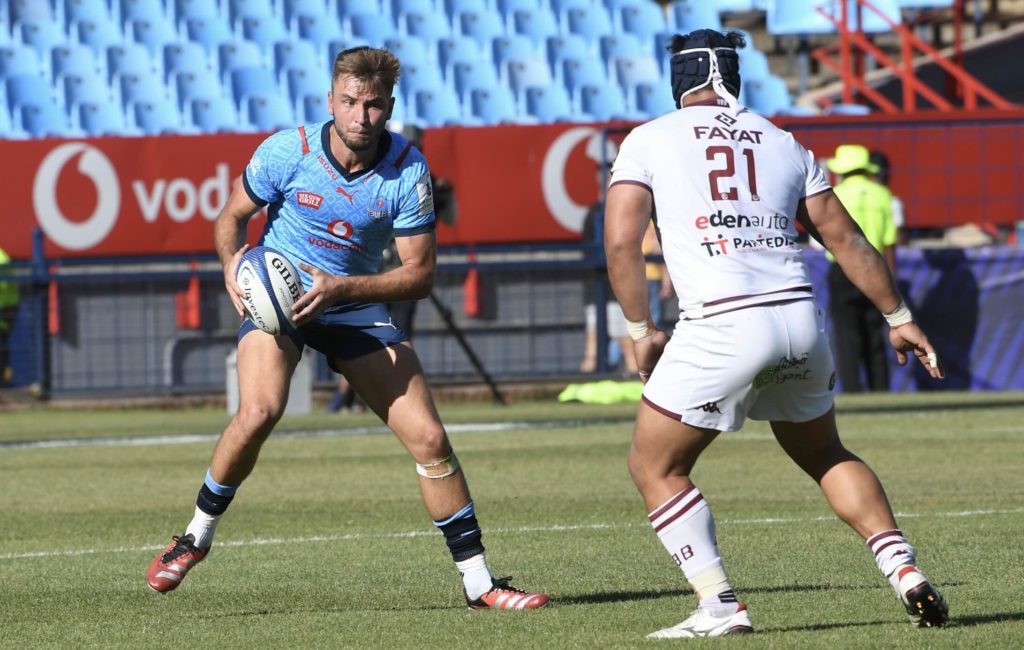
The Bulls are backing their Boks to bully champions Bordeaux of France in this weekend’s opening round of the Investec Champions Cup, writes Mark Keohane.
Every Bulls player on tour with the Springboks in November will be involved as the Bulls look to maker a statement performance against last season’s champions.
Bordeaux and the Bulls played each other at Loftus in the 2024 Pool Stages, with the Bulls winning a 12-try thriller 46-40. Both teams scored six tries two seasons ago and the difference ultimately proved two penalty kicks.
Handre Pollard, the king of kickers, returns to Loftus for his first start in the Champions Cup in the colours of the Bulls. Pollard’s previous Champions Cup history had been with French club Montpellier and English club Leicester.
Pollard will be significant to any Bulls challenge in the greatest club competition in the world, but it is the potency of a power bench that will be the determining factor in this match.
The starting front row from the Springboks 73-0 against Wales in Cardiff a week ago, are on the bench in Gerhard Steenekamp, Johann Grobbelaar and Wilco Louw. Ruan Nortje, the Boks form lock, is among the replacements, as are Elrigh Louw and Embrose Papier, who have played for the Springboks.
AFRICA PICKS: HOW TO CASH IN ON BULLS, SHARKS AND STORMERS
Louw will start his first match in a year after a lengthy spell out of the game because of injury.
Springboks flyer Canan Moodie links up with Springboks Test Centurion Willie le Roux in a back three complimented by the talents of winger Sebastian de Klerk and current Bok Marco van Staaden joins former Bok Marcelle Coetzee in the back row.
There are 13 Springboks in the match 23, with eight of them part of the Springboks 2025 squads. That includes Elrigh Louw, who was picked in the initial squads but did not play because of injury rehabilitation.
WATCH: KEO & ZELS ON THE BULLS, STORMERS AND SHARKS
The Stormers have also mixed and matched for their opening round at Bayonne, where the hosts only home defeat last season was to the Bulls in the Champions Cup.
Boks back superstars Sacha Feinberg-Mngomezulu, Damian Willemse and Cobus Reinach were not considered for the match, given their heavy workloads for the Stormers and Boks over the past two months, but Boks flanker BJ Dixon will play.
The Sharks, who play six-times champions Toulouse, are without several of their current Boks, but will still field a match 23 with international experience.
It is unlikely to be enough to prevent a one-side beating, given the Sharks struggles all season in the URC.
BORDEAUX BÈGLES – 15 Romain Buros, 14 Damian Penaud, 13 Nicolas Depoortere, 12 Yoram Moefana, 11 Louis Bielle-Biarrey, 10 Matthieu Jalibert, 9 Maxime Lucu (c), 8 Temo Matiu, 7 Cameron Woki, 6 Bastien Vergnes-Taillefer, 5 Adam Coleman, 4 Boris Palu, 3 Carlü Sadie, 2 Maxime Lamothe, 1 Jefferson Poirot.
Bench: 16 Gaetan Barlot, 17 Matis Perchaud, 18 Ben Tameifuna, 19 Jonny Gray, 20 Tiaan Jacobs, 21 Arthur Retiere, 22 Rohan Janse van Rensburg, 23 Salesi Rayasi.
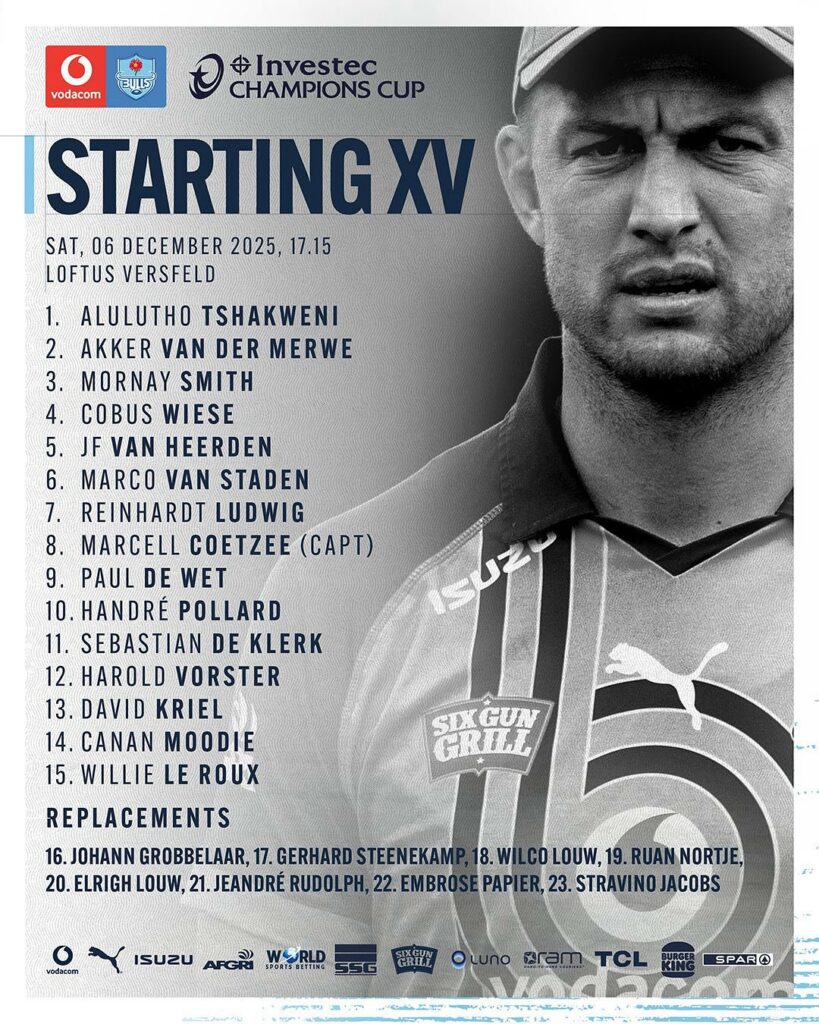
SOUTH AFRICA’S INVESTEC CHAMPIONS CUP TRIO CHASE THEIR FIRST STAR
International Rugby
Van Graan’s true impact at Munster revisited
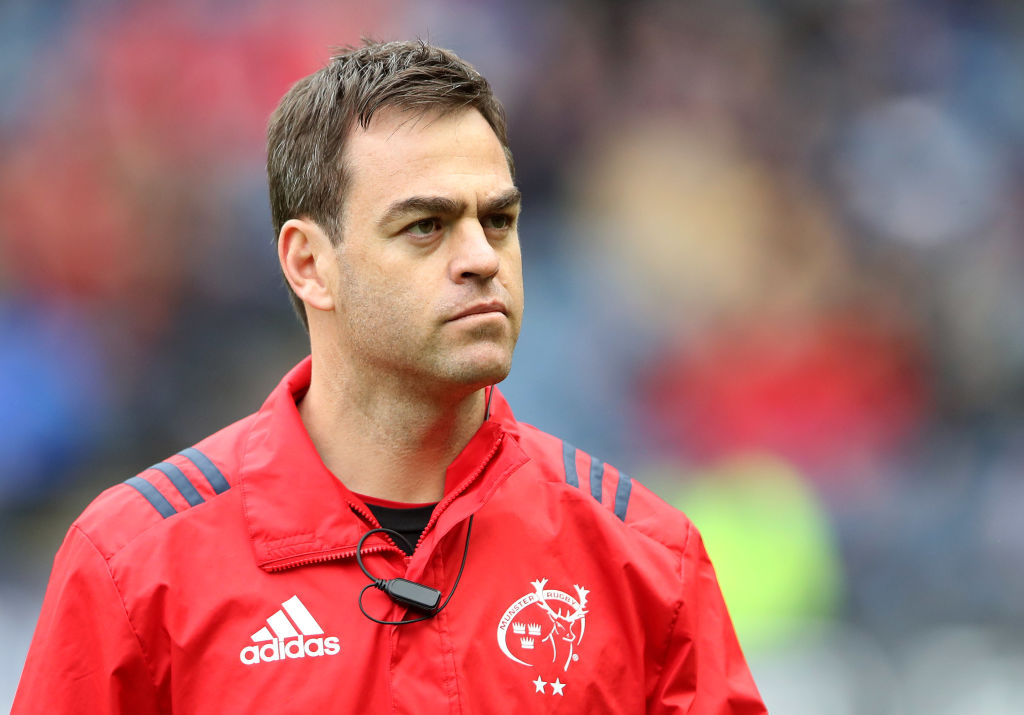
If ever there was a weekend to revisit Johann van Graan’s time at Munster then this is surely the one. And it could be that history is starting to pass more favourable judgement on his time there, and certainly of him as a coach. It should do.
As Bath host Munster in the Investec Champions Cup, in part this view is coloured by what van Graan has achieved at the Rec. On foot of leaving Munster in 2022, van Graan took over a side marooned at the foot of the English Premiership. Their rise since has been remarkable.
They ended that first season with a four-game winning run to finish eighth and qualify for the Champions Cup, where they reached the knockout stages for the first time in ages.
In his second season, Bath reached the Champions Cup knockout stages again and also finished second in the Premiership, only to lose the final to Northampton 25-21. Perhaps the biggest measure of the esteem in which he is held at Bath is that during that campaign van Graan signed a six-year extension up to 2029-30.
The club’s CEO Tarquin McDonald told TNT Sports: “We brought in an exceptional head coach and, really importantly, backed him. He’s a selfless leader. Genuinely it’s about team first and club first, and that’s so important.
“We extended Johann’s contract out to 2030 and the last time we went into a second cycle with a head coach was Jack Rowell, who was with us from ’78 to ’94; our first golden era as we like to call it, and, crazily, since then we’ve never been through a second cycle with a head coach.
“Where we are now, there’s continuity, which is absolutely vital for sporting success.”
The wisdom in that long-term extension was demonstrated last season, when Bath not only topped the table but hoovered up a treble of Premiership Cup (so ending a 17-year trophy drought), Challenge Cup and Premiership, which was their first league title in 29 years.
This is particularly ironic as the main source of criticism directed at can Graan is that his five seasons at Munster were trophyless. Yet, while Munster won the URC title under Graham Rowntree in 2022-23, is that too crude a yardstick?
Van Graan was derided for pointing to Munster’s 80 per cent winning record in his fifth season there. Yet it is true, and it has never been matched in Munster’s three completed seasons since. Indeed, Munster’s 67 per cent winning ratio overall in van Graan’s five seasons at Munster has dropped to 55.5 per cent in the three campaigns that followed.
Munster were also much more consistent, knocking on the door every season in both competitions. They reached three semi-finals and a final of what is now the URC before invariably running into the machine that was Leinster. In the Champions Cup, Munster also reached two semi-finals, a quarter-final and a round of 16. In the last three seasons they’ve had two last-16 exits and one quarter-final after that epic win in La Rochelle. That was their only knockout win in the Champions Cup since van Graan moved on.
His Wikipedia page says: “Van Graan’s Munster legacy is debated”. It adds: “While he took them to five semi-finals and a final, he never won a trophy. Some critics perceived his style as overly conservative.
“However, figures such as Simon Zebo have defended his record, describing Van Graan as a ‘master tactician’.”
Zebo told The Irish Times this week: “He goes into unbelievable detail. I would rate him very highly as a coach. He’s very good at finding little gaps or weaknesses in the opposition and he’s unbelievable at filling you with confidence and detail. He creates a very good environment. I enjoyed working with him and he’s a gentleman.”
Current players and coaches at Munster have said the same these past few weeks. In discussing his time at Munster, Tadhg Beirne told me, without being prompted: “I thought Johann was incredible when he was in there. I thought at times he got a hard rap for what he did, but in terms of the circumstances and what he was producing, it was very impressive.”
Beirne is not surprised by what van Graan has achieved at Bath.
“No, but if you look at his track record at Munster, he was getting us to semi-finals and finals all the time. I thought he was an unbelievable coach.
“I got on unbelievably well with him, and I thought he managed the group quite well. I thought he got the best out of a lot of players. I know, obviously, there’s going to be a lot of players who dislike him, because that’s like any coach, if you’re not playing, I suppose, as well, it’s easier not to like someone.
“I don’t know what the situation was in Munster at the time, but he probably wasn’t able to bring in the people he would have liked to have brought in. But what he achieved with us was still pretty impressive. It’s just you would have liked to have seen him have silverware on top of it, because I think he was deserving of it.”
John Hodnett was given his first Munster cap by van Graan, and admits his view is coloured by that.
“You always remember the coach that gave you your first cap, and he gave me my first cap. So yeah, I’d have good time for him. He’s a nice way about him. He’s a very nice man. He has a good plan in place. He gets good people in.”
Asked about van Graan’s legacy at Munster this week, Denis Leamy said: “Johann is a brilliant coach. He’s very highly rated. One thing that I’ve noticed here, you’ll never hear anyone say anything bad about Johann. He’s always spoken about in a really positive light.
“My own experiences with him have been nothing but insightful and he’s very generous with his knowledge. I worked with him here for maybe three months when I was working with the academy and I just thought he was a fountain of knowledge.
“It’s great to see him push on and achieve such great things with Bath over the last couple of years. They won three trophies last year, so fair play to him. It’s a great sign of his progression.”
International Rugby
South Africa’s top club trio chase their first Investec Champions Cup star
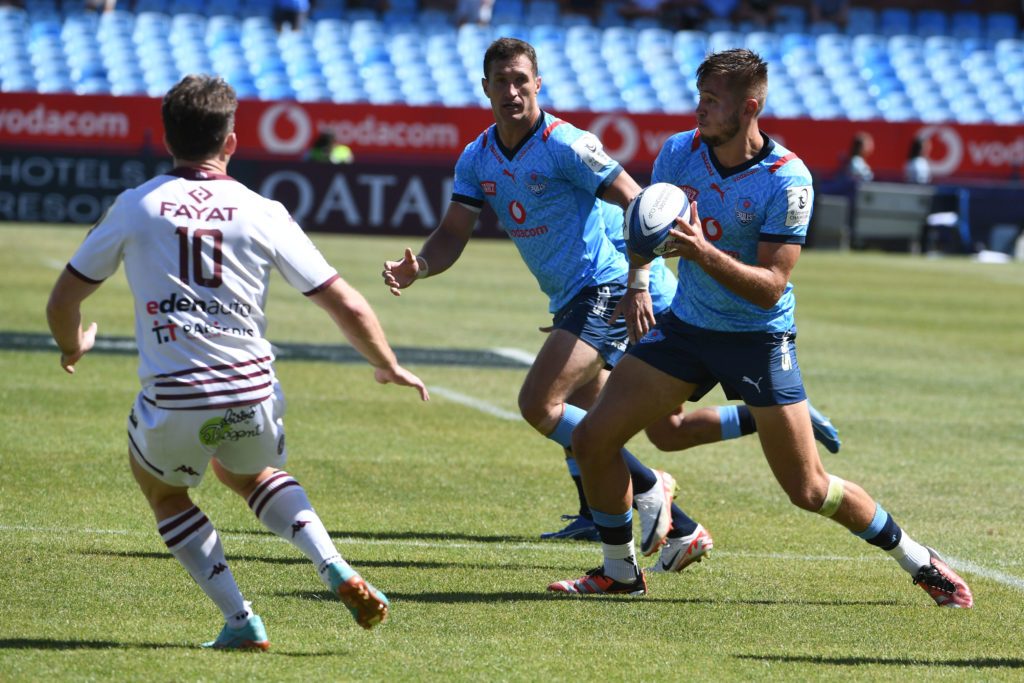
South Africa, at Test level, rules the rugby world, but in the Investec Champions Cup, the toughest club competition in the sport, the winning of the golden star has remained elusive for South Africa’s top club trio, writes Mark Keohane.
Toulouse, with six stars (titles), are the most successful club in the history of the Investec Champions Cup. Ireland’s Leinster have four stars and Toulon and Saracens have three each. For the rest, it has been a fight to get on the board and just 13 of the 40 clubs from Europe and South Africa have won the title.
It shows just how tough it is to succeed in the most battle hardened and complex knockout tournament in world rugby.
Saracens and England veteran Jamie George described the tournament as a World Cup knockout played over six months, with each match, from the opening league match, to the final, a knockout.
Home wins, in the league stages are non-negotiable, and wins on the road are as golden as the star the players are chasing.
Northampton’s Saints last season travelled to Pretoria and stunned the Bulls in the league stage, which proved crucial to their play-offs, where the English club won at the Aviva Stadium in Dublin against Leinster, before being edged 28-20 by France’s Bordeaux.
The defending champions are in South Africa to start the defence of their historic first ever Investec Champions Cup title. They play the Bulls at Loftus in Pretoria on Saturday, revisiting the scene of their dramatic 46-40 league defeat to the Bulls on the 20th January, 2024. It is the only time the two teams have met in the competition.
Both teams scored six tries in a 12-try thriller, with Bordeaux finishing the stronger.
Bordeaux, winners of the title in Dublin last season, beat their French rivals Toulouse in the semi-finals, but lost in the final of the Top 14.
The Bulls also lost in the final of last season’s United Rugby Championship, beaten by Leinster in Dublin, and both teams have had an indifferent start to their local competitions. The Bulls are three from six in the URC, having lost their last two matches, including a stunning home upset against the South African Lions last Saturday, while Bordeaux are also three from six in the Top 14, including successive defeats in the past fortnight, at home to Pau (33-34) and away to Montpellier (24-28).
The defending champions have a star-studded international squad with French flyhalf Matthieu Jalibert and flying wingers Louis Bielle-Biarrey and Damian Penaud among the best in the world.
South African prop Carlu Sadie is a regular in the Bordeaux set-up, as is the popular former All Blacks and current Tongan captain and 150 kilogram prime rugby beef Ben Tameifuna.
French scrum half Maxime Lucu is the general of a squad that includes a handful of imports from Australia and the Pacific Islands.
The Bulls, with 20 Springboks, past and present in their Champions Cup squad, will have their imposing Bok quartet of Gerhard Steenekamp (loosened prop), Johan Grobelaar (hooker), Wilco Louw (tighthead prop) and Ruan Nortje (lock), back for the tournament.
All four featured prominently in the Springboks five successive Tests wins in the Northern Hemisphere during November.
Springboks double World Cup winner Handre Pollard is another who will significantly improve the Bulls prospects of being the first South Africa team to wear an Investec Champions Cup star.
The struggling Sharks have the toughest of starts, away to Toulouse this weekend, while the in-form Stormers are in France to play Bayonne, who last season lost just once at home. That defeat was to the Bulls.
For all the latest EPCR Investec Champions Cup News
Follow the news on the Bulls, Sharks and Stormers
Investec Champions Cup fixtures (Round 1, SA times)
Friday, 5 December
Bayonne vs Stormers, 10pm
Sale Sharks vs Glasgow Warriors, 10pm
Saturday, 6 December
Saracens vs Clermont, 3pm
Bulls vs Bordeaux Begles, 5:15pm
La Rochelle vs Leicester Tigers, 7:30pm
Leinster vs Harlequins, 7:30pm
Scarlets vs Bristol Bears, 10pm
Bath vs Munster, 10pm
Sunday, 7 December
Pau vs Northampton Saints, 3pm
Toulouse vs Sharks, 5:15pm
Gloucester vs Castres, 5:15pm
Edinburgh vs Toulon, 7:30pm
-
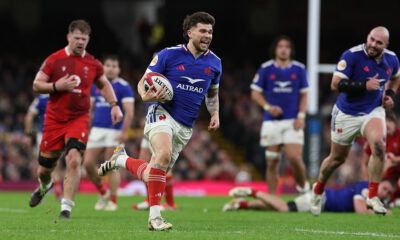
 International Rugby5 days ago
International Rugby5 days agoWho’s running the hottest in the Six Nations
-
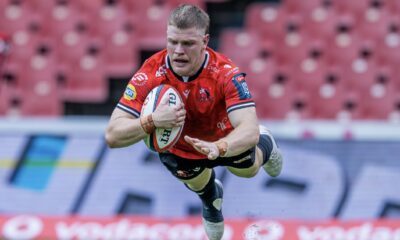
 International Rugby2 days ago
International Rugby2 days agoURC: Julius stars but the Lions roar loudest at Ellis Park
-

 International Rugby2 days ago
International Rugby2 days agoIreland find their identity & Scotland find a way to win away from home
-
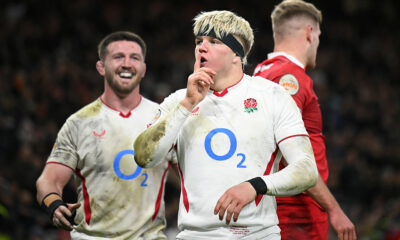
 International Rugby3 days ago
International Rugby3 days agoRound 3 of Six Nations: Everything you need to know
-
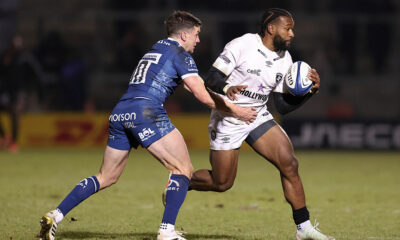
 KEO News Wire3 days ago
KEO News Wire3 days agoEllis Park is a Springboks audition for Julius and Van Wyk

